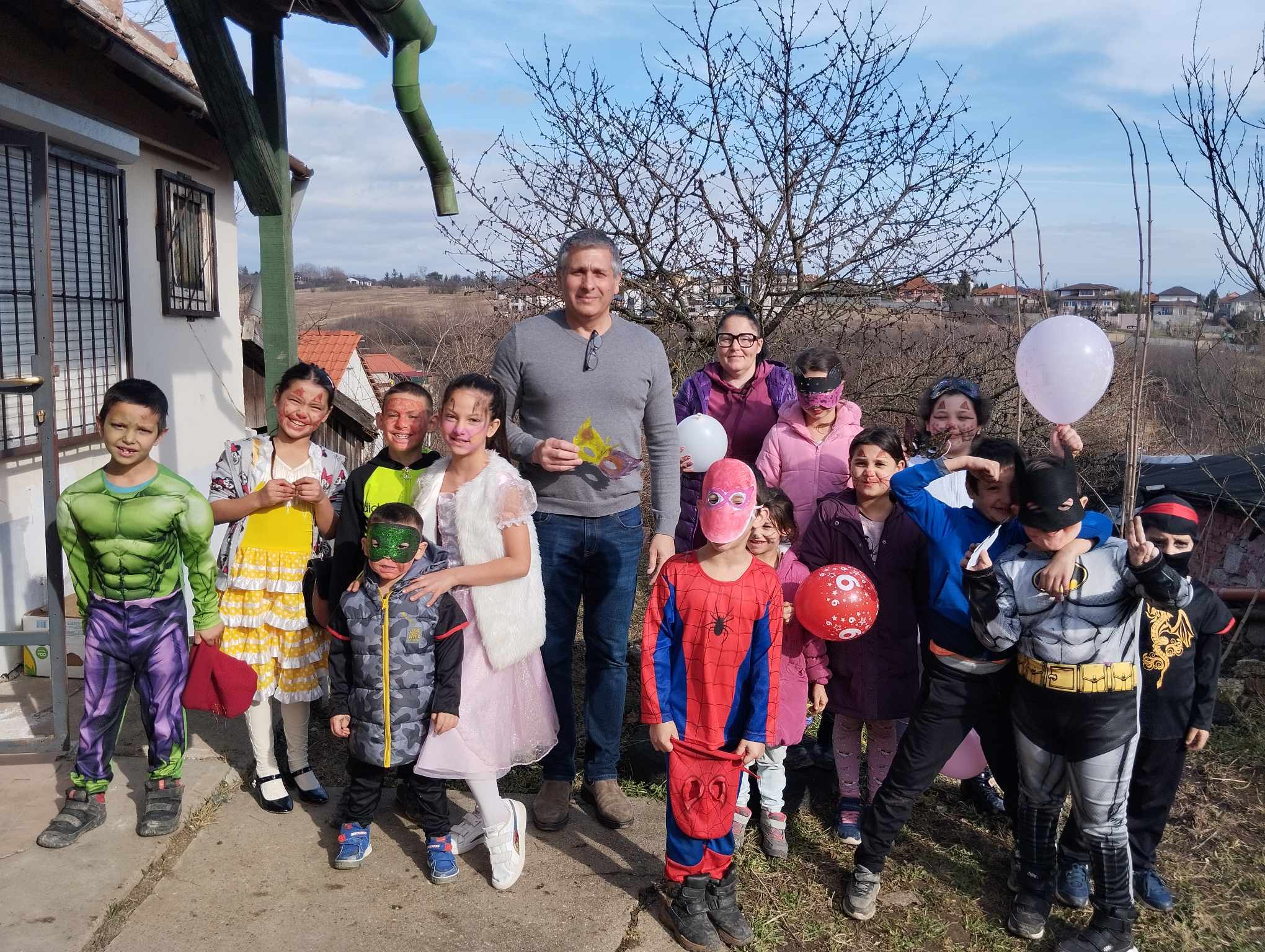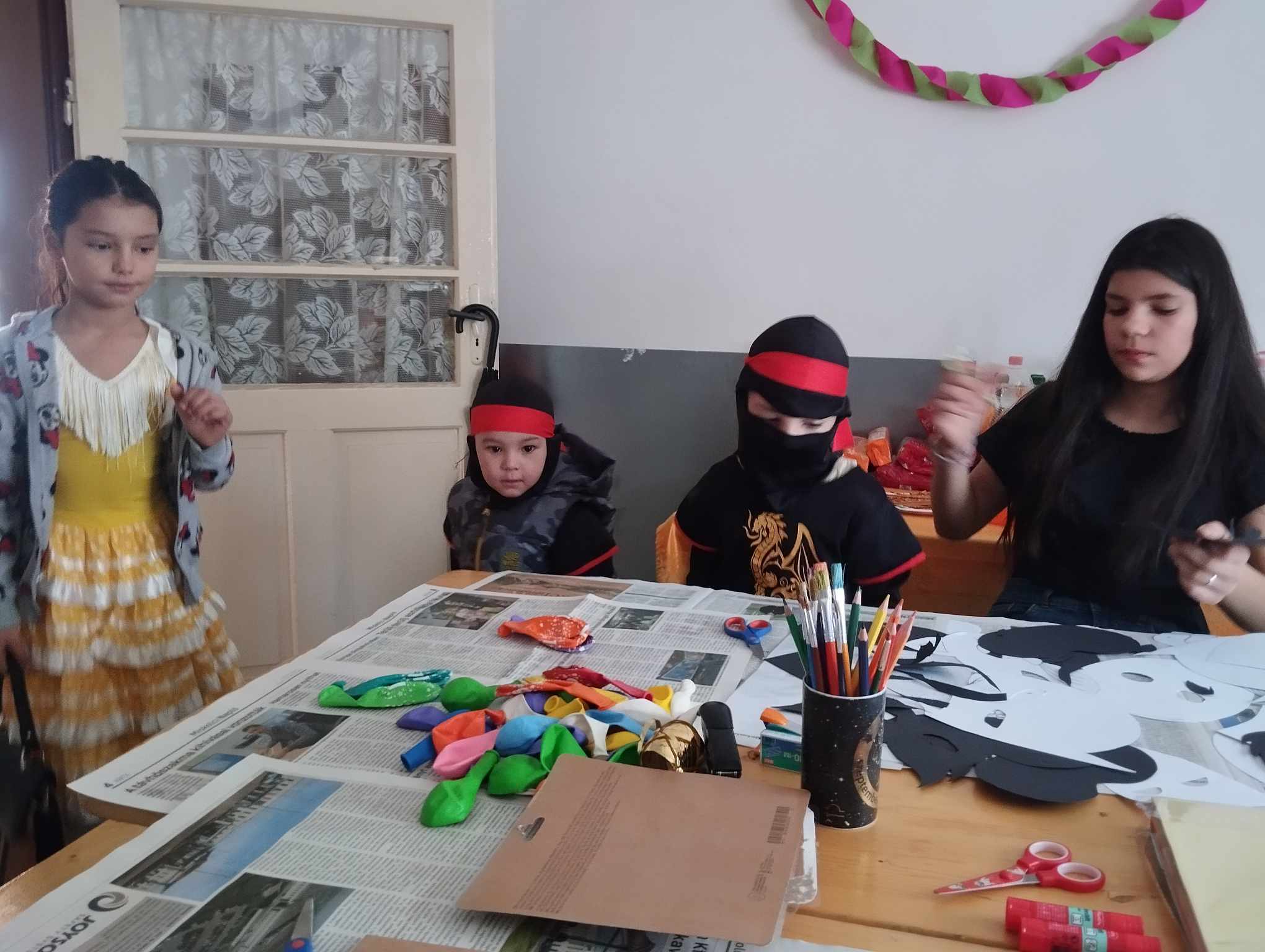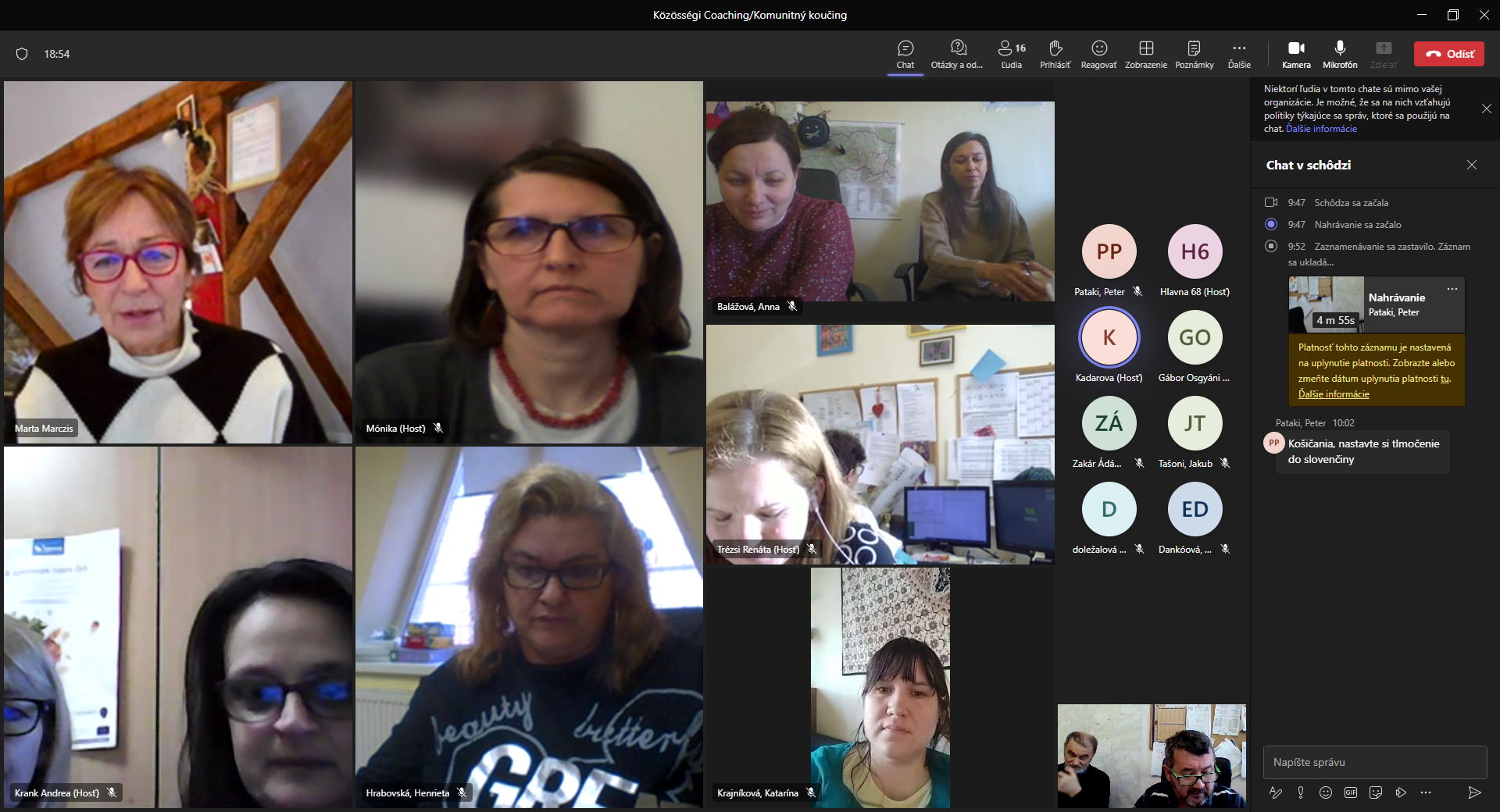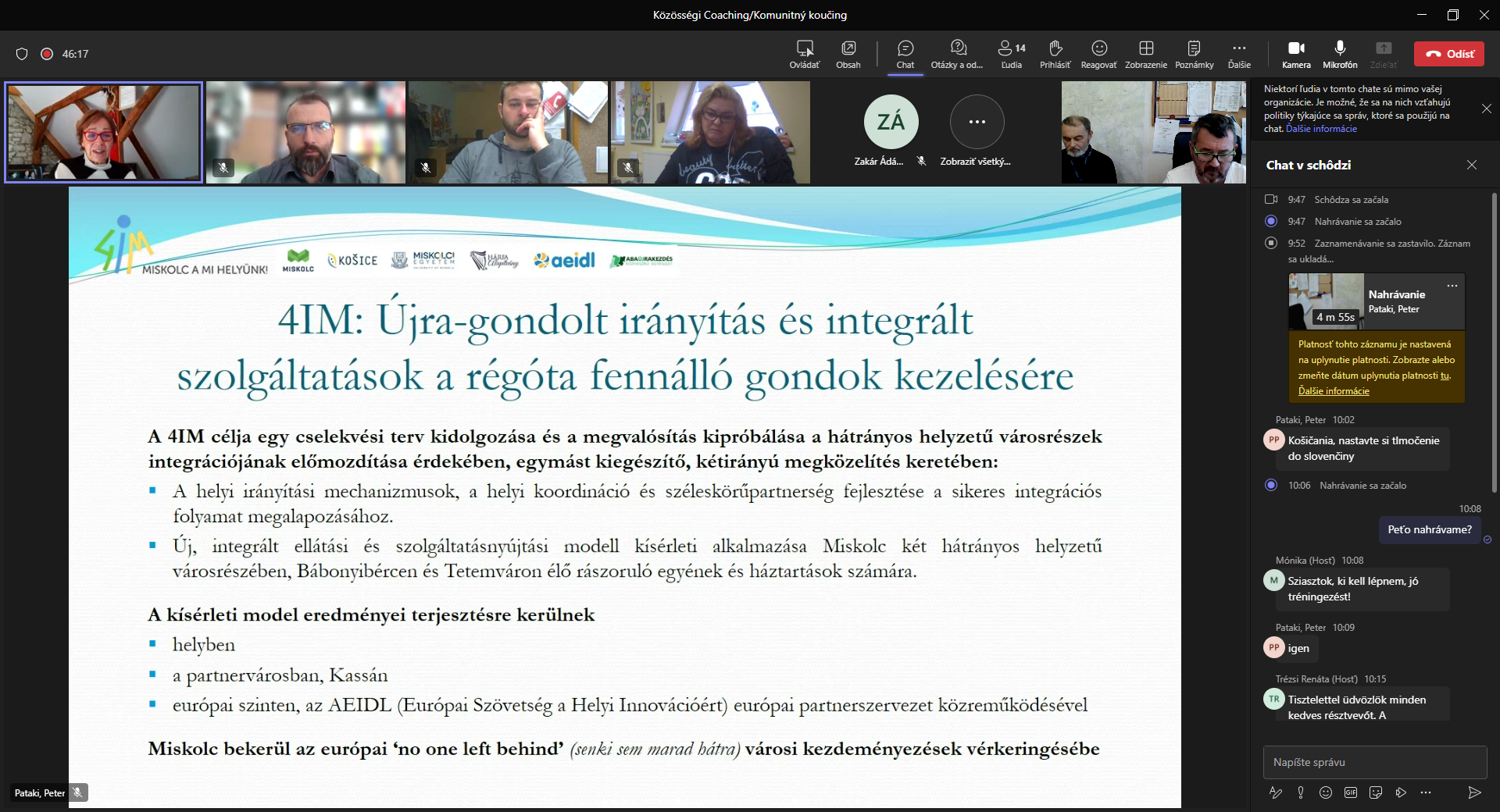June 2024
Study summarizes the professional experiences of the 4IM project
One of the purposes of the pilot project was to present in a detailed professional study the work carried out in almost 2 years and also the results so that they could be used by others. The final study is available in both Hungarian and English.
May 2024
A professional conference summarized the experiences of the 4IM project
The purpose of the final conference on May 7, 2024 was to present to local and external stakeholders, representatives of the partners, and the relevant policy makers the project's realized activities, achieved goals, experiences and the possibilities of future utilization of the results.
The guests of the conference were welcomed by Mayor Pál Veres, Katalin Somody, project manager of the European Commission's Directorate-General for Employment, social innovation group, and Miklós Vecsei, vice president of the Hungarian Charity Service of the Order of Malta.
After that, the attendees listened to professional presentations, which are available here.
Varga Andrea Klára - A 4IM projekt szakmapolitikai kereteinek bemutatása
Márczis Márta - A 4IM projekt módszertanának ismertetése
Scharle Ágota - A minimáljövedelem kiterjesztésének lehetőségei Magyarországon
Krank Andrea - A 4IM keretében létrehozott, innovatív intézményrendszer bemutatása
Zakár Ádám - A közösségi coaching módszer tapasztalatai
Pető Ágnes - A Foglalkoztatási szolgáltatási csomag bemutatása
Dr. Tózsa-Rigóné Dr. Nagy Judit - Az Oktatás-képzési szolgáltatási csomag bemutatása
Rézműves Jenő - Motiválás és mobilizálás szolgáltatási csomag bemutatása
Vízkeleti Andrea - Tájékoztató az EaSI Programról és az aktuális pályázati felhívásokról
Toby Johnson - Európai kontextusban a 4IM



Video: Trainings supporting (re)employment
The professional staff of the 4IM project had great emphasis on helping labor market (re)integration. To this end, the specialists organized several training sessions supporting employment during the project period: among other things, digital job search methods, which are essential in our age, or how people who have been away from the labor market for a longer period of time - for example due to having children - can return to the world of work.
Where can we turn for help in a difficult situation?
In the following publication, we have collected several life situations that may require help. We have listed what kind of support we can expect, and how we can get in touch with the relevant institution or organization.
Anyone can find themselves in a situation in their life when they need help: some people come from difficult circumstances, while for others an unexpected event shapes their everyday life in such a way that they need external support.
Miskolc tries to help in such cases in many ways. Whether it is the local government of Miskolc and its social care system, or even non-profit organizations that have signed a supply contract with the Municipality.
Let's turn to them with confidence!
Social services of the city of Miskolc aimed at increasing employment
Memories of the family day in Tetemvár on video
Social service providers and educational institutions were represented at the Tetemvár event of the 4IM project. In addition to the community program, the locals were also informed about the various opportunities available to them. The short film summarizes the professional goals of the program.
April 2024
The residents of Tetemvár and Bábonyibérc got to know the social service providers on a family day
Special events were organized by the professional staff of the 4IM project for the two target areas of the program.
Basically, the purpose of the community events was to mix the pleasant with the useful. The family days in Tetemvár on April 10 and in Bábonyibérc on April 30 offered recreational opportunities for residents of the two target areas, especially for the children. At the same time, the professional staff also wanted to address the accompanying parents, so representatives of the social service providers available to them were also present at the events to inform the families about their options in an informal atmosphere.
Tetemvár



Bábonyibérc



The Social Innovation Council was working on the sustainability of the 4IM project
Members of the expert advisory board established as part of the program met on April 17, 2024. Nearing the end of the 4IM project, with the help of a moderator, the participants examined how the results of the program could sustain even after the end of the project period.
Whatever the project, it can generally be said that the given project provides the opportunity for work in a certain period. Therefore, it is necessary to plan sustainability in terms of preserving the results.
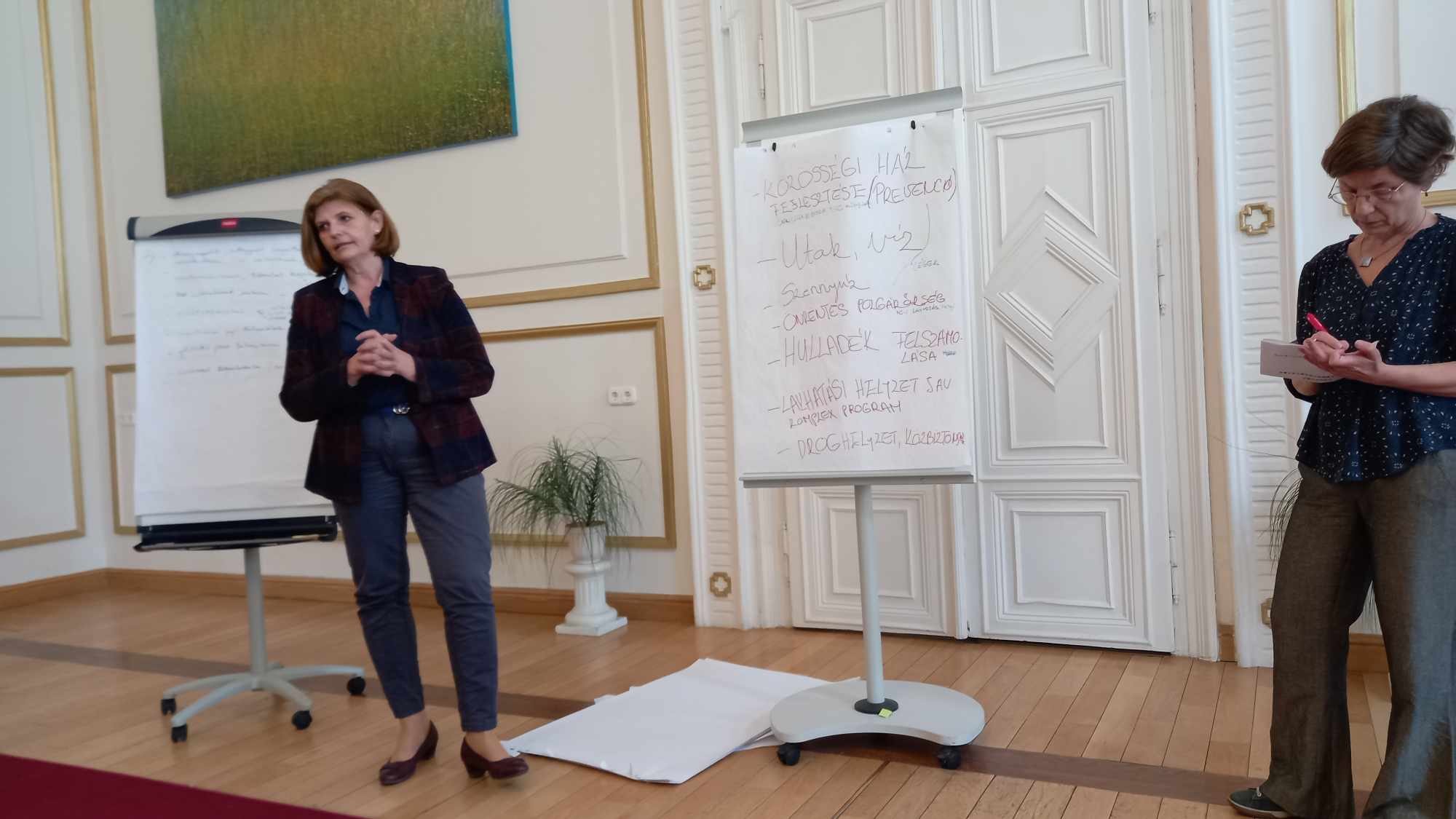
Ágota Scharle, lead researcher of the Budapest Institute, helped the professionals of the Social Innovation Council to think together as part of the board's last meeting.
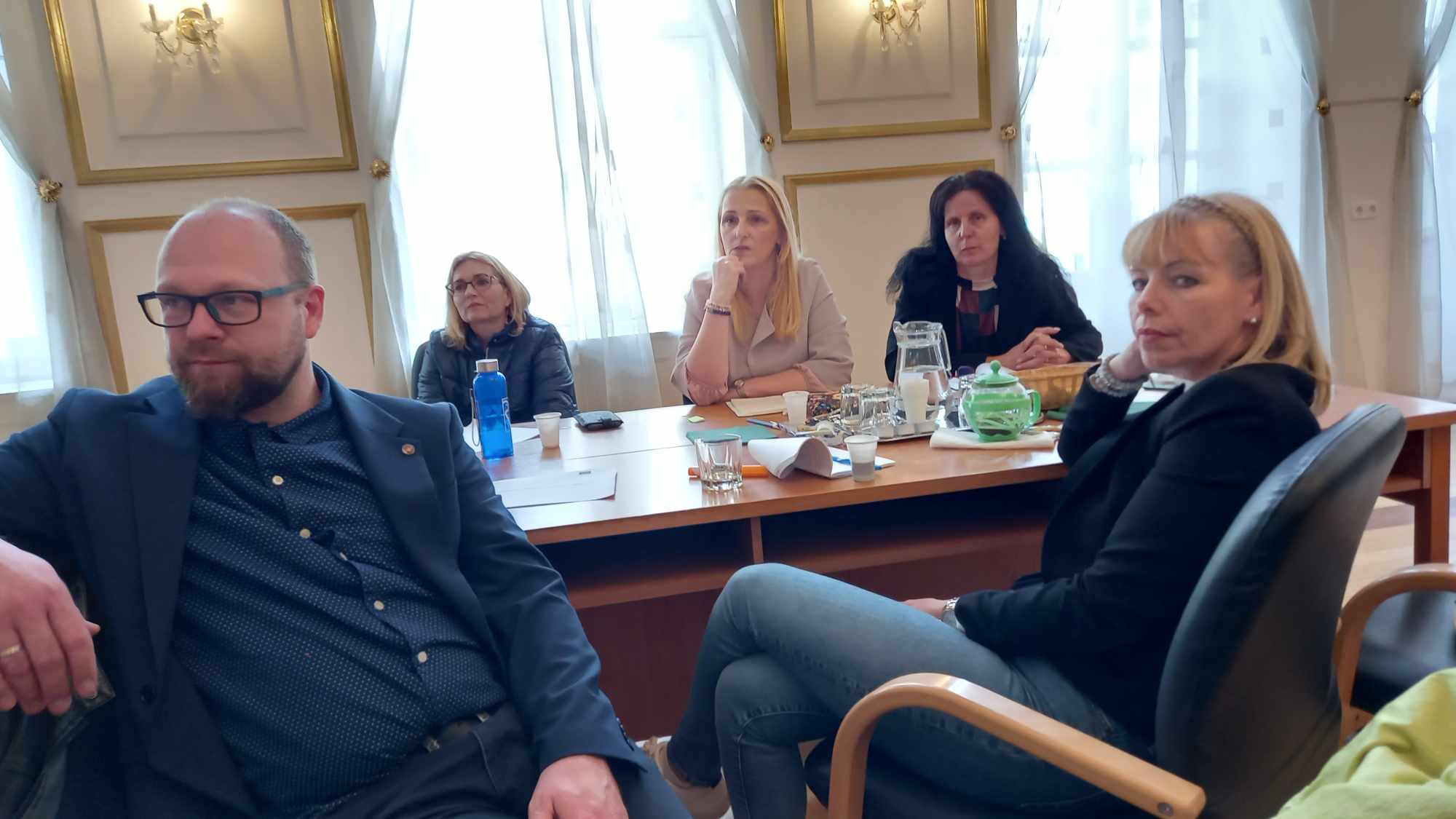
The attendees selected two of the five service packages of the 4IM project: the one aimed at employment and improving the quality of life. According to their experiences - although each is equally important -, these two motivate the target groups the most. After that, they assessed the obstacles and looked for ways to overcome them.
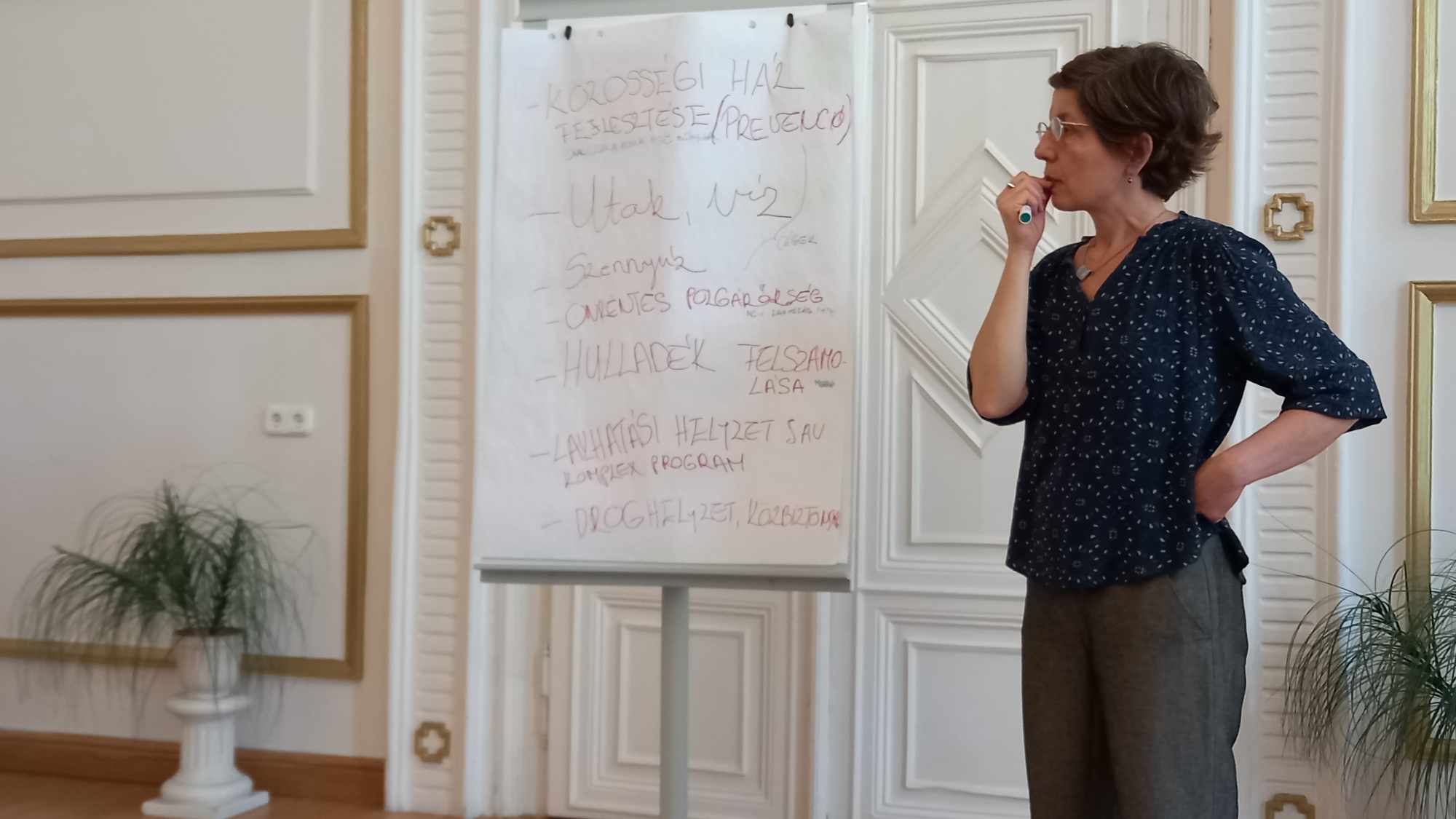
The specialists eventually found the sustainability of the project's results in the involvement of additional resources and partners.
Video: Factory visit at "Tű, cérna, szeretet" sewing workshops in Miskolc
The Social Innovation Resource Center organized a factory visit for a total of seven women from Tetemvár and Bábonyibérc. Residents of Miskolc interested in employment - thanks to the 4IM project - visited two "Tű, cérna, szeretet" sewing workshops of the Borsod-Abaúj-Zemplén County Organization of the Hungarian Red Cross. The program wanted to set a good practical example for job seekers.
March 2024
The 4IM project was presented at a social innovation conference
At the TINLAB-URBAN21 conference held in Cegléd, deputy mayor Andrea Varga, the project's professional policy leader, gave a presentation on the project.
The central theme of the March 21 event was an issue that is increasingly pressing for the majority of municipalities. A significant number of settlements are now continuously losing their population. Moreover, those residents who decide to move elsewhere are typically from the younger, more highly educated social strata. The continuous population decline and the emigration of talents have serious negative consequences for the settlements and for those who remain. Those settlements that are unable to provide adequate answers to this challenge will be permanently torn apart.

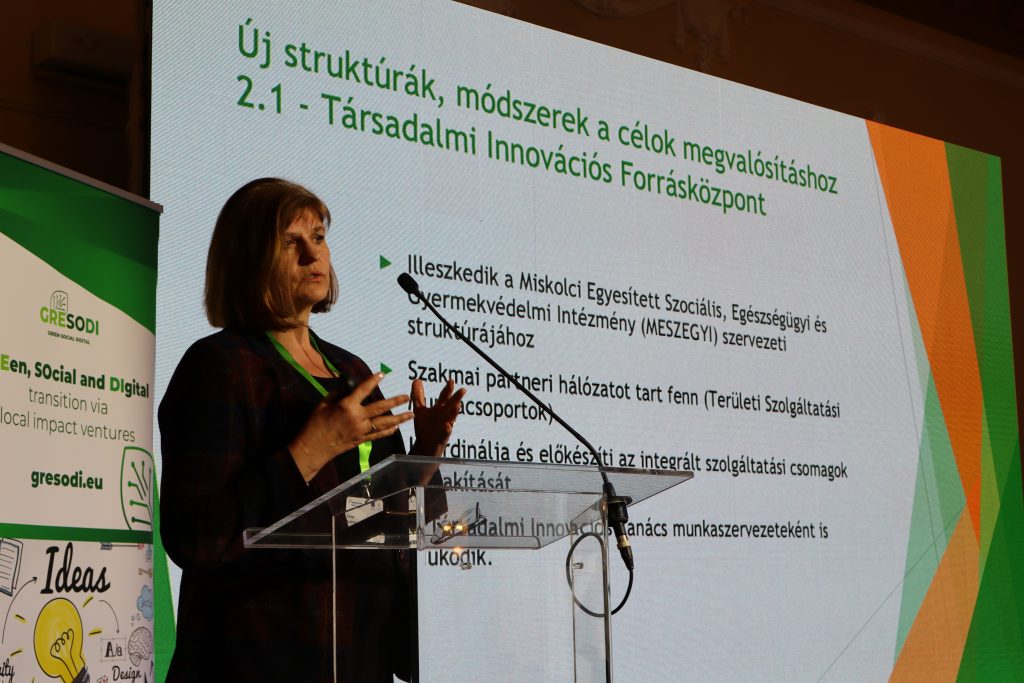
The 4IM project, which ensures the targeted coordination of social and employment services in order to catch up with the majority of the society, fits into this theme. You can hear more about this in Andrea Varga's presentation, which can be watched in Hungarian language in the video below.
The Miskolc staff of the 4IM project discussed their professional methods at Kosice
The Miskolc delegation of the program paid a professional visit to the Slovak city at the end of February. The purpose of the field meeting was to discuss the experiences of the work carried out during the project period: after the professional discussion, the Slovak colleagues showed the practical elements during a tour of the Luník IX district in Kosice.

In the "4IM - Miskolc is our place!" project, Kassa and Miskolc, which are twin cities anyway, work together as partners. During the visit on February 29th, the members of the staff of the 4IM project in Miskolc were curious about their methods and to what extent the colleagues from Kassa were progressing in their primary target area, the Luník IX housing estate. In addition, they wanted to report on the application of the community coaching method in Miskolc to the representatives of the Slovak partner.
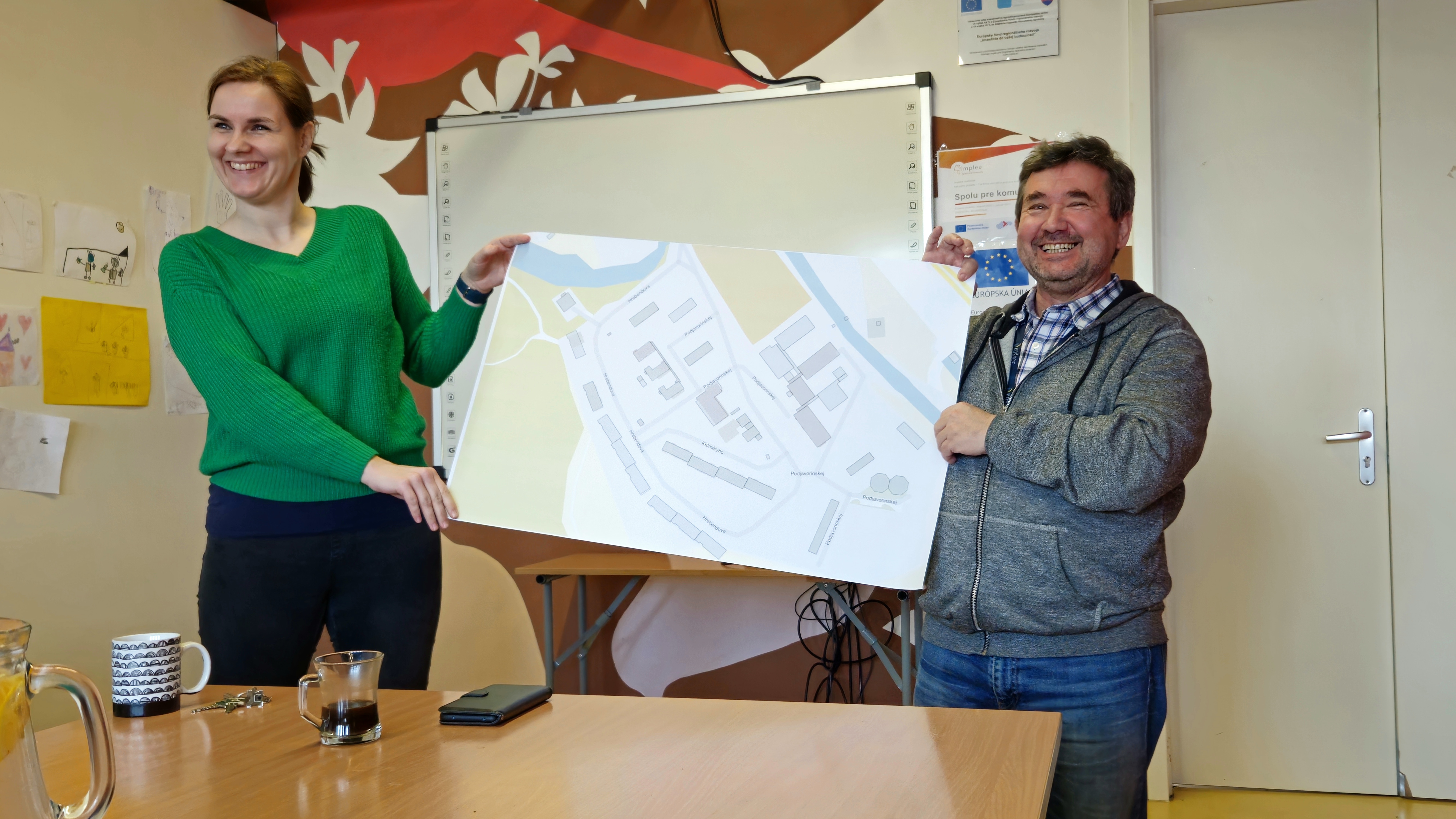
With the help of his colleagues, Igor Rolný gave a summary of the complex work carried out in the area of Luník IX, after which the guests from Miskolc got to know the practical aspects of the social work carried out in the district on a site visit.
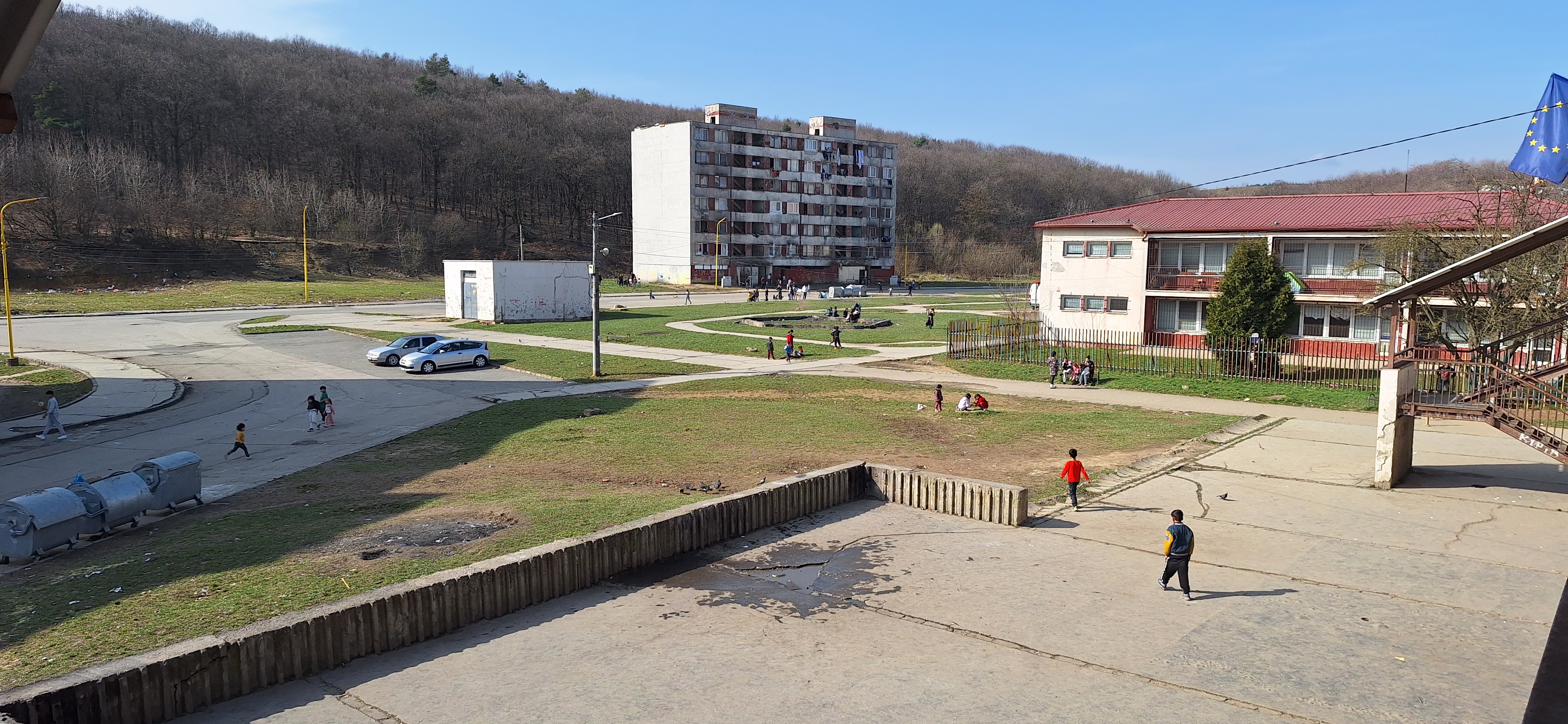
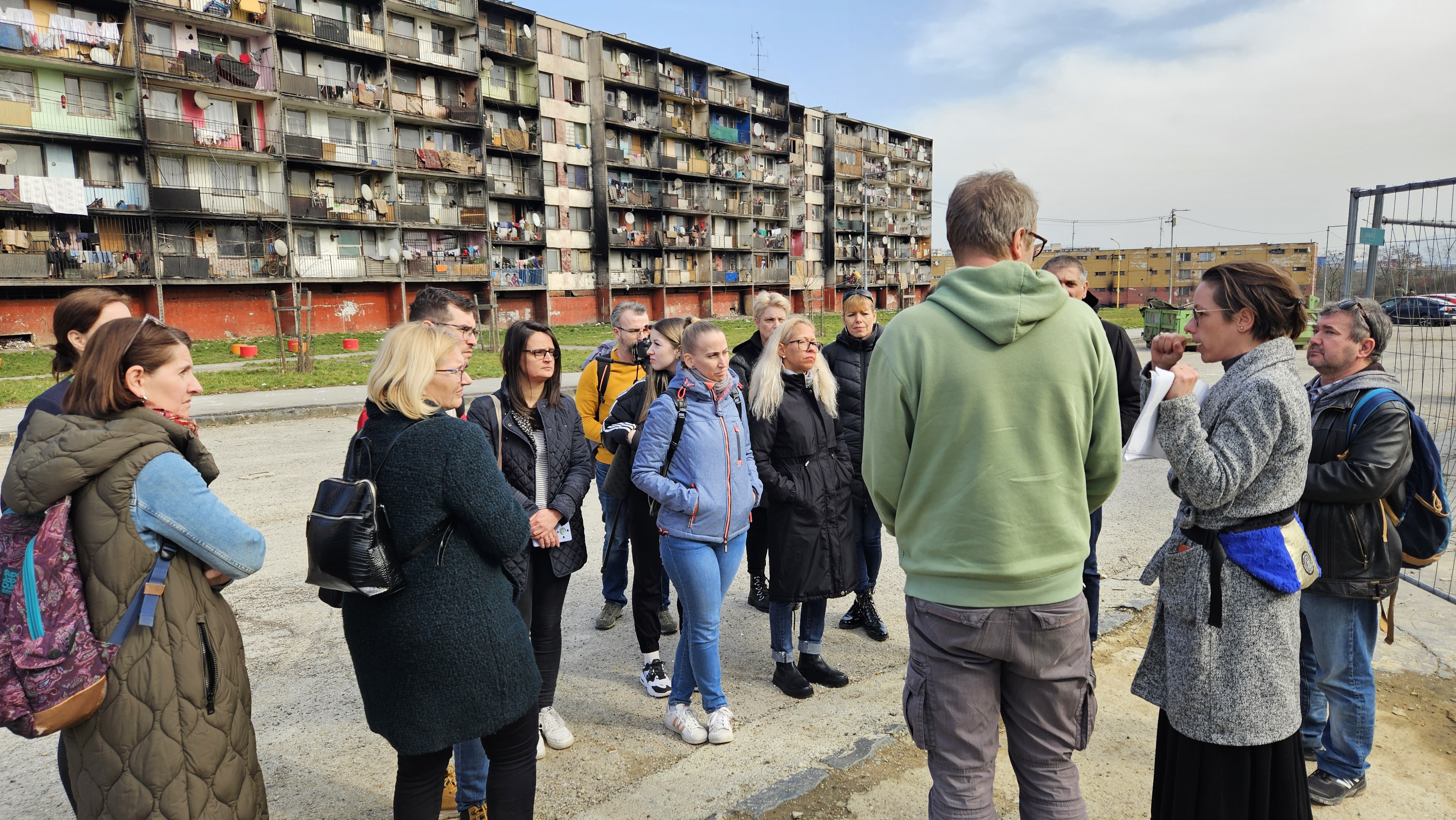
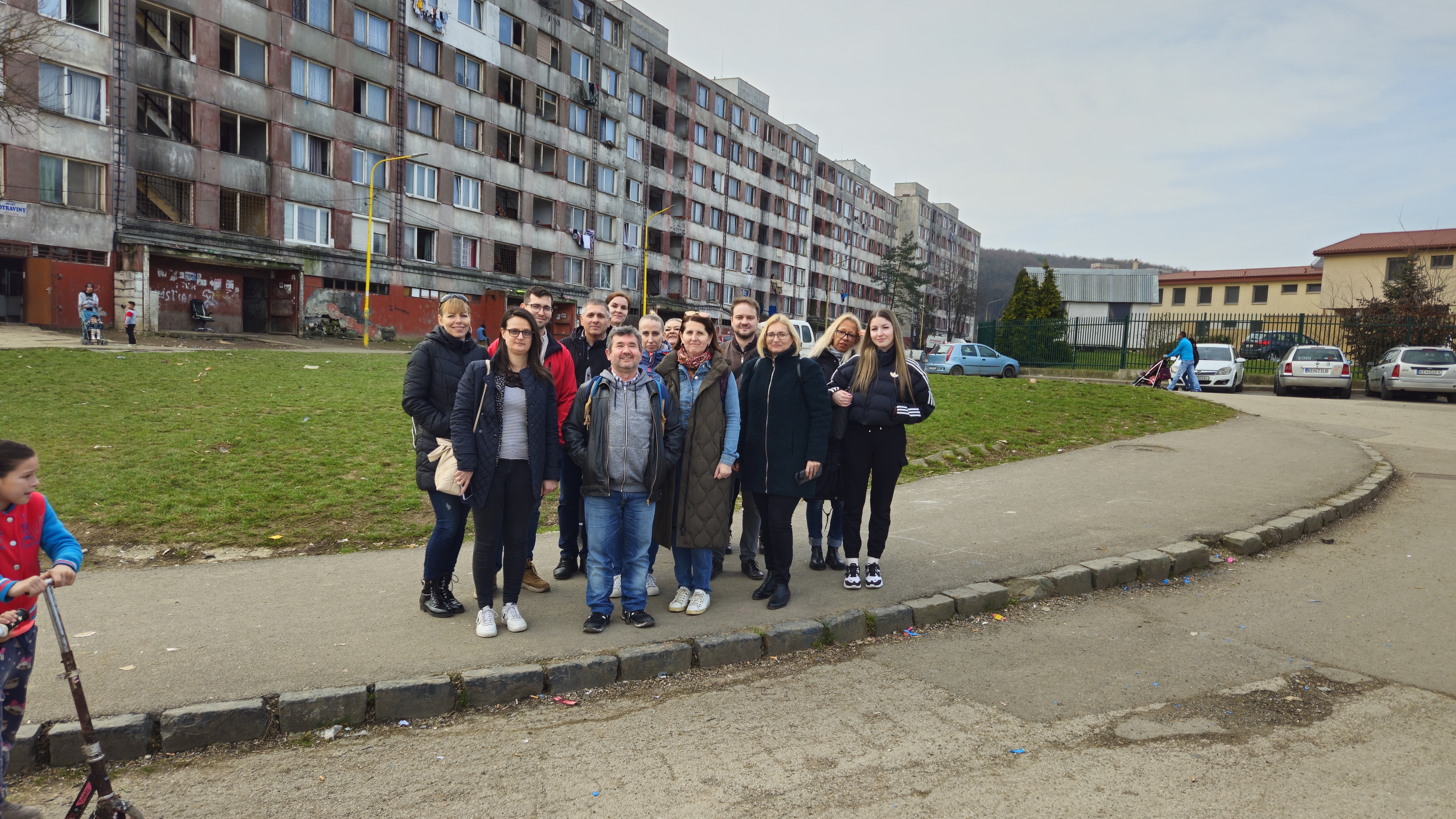
February 2024
Video: Carnival is an excellent opportunity to get involved in community life
As we reported earlier, the professional staff of the 4IM project organized a carnival event in both Bábonyibérc and Tetemvár. A short film covering the latter event has been completed, and by watching it, we can gain a glimpse into community life and professional work. The video is in Hungarian.
Community carnivals at Bábonyibérc and Tetemvár
The professional staff organized carnival programs in both target areas of the 4IM project. The primary purpose of these was community development, in addition to addressing the parents through their children, and giving the young people a joyful experience. The professionals' intentions were partially fulfilled, and the events were successful.
There is enormous power in communities, but to reach their full potential, they must be worked and developed. Regular community events can be excellent opportunities for development work. In mid-February, the carnival events provided the opportunity for this.
Members of the professional staff organized events at Bábonyibérc and Tetemvár. About 15 children between the ages of 3 and 15 participated in the Bábonyibérc. They made creative masks, and their enthusiasm was reflected in the results. Those who wanted more, could get face painting.
All of this was welcomed with joy, and they seemed to have a good time at the program. So much, that some of the older girls stayed after and helped with tidying and cleaning.
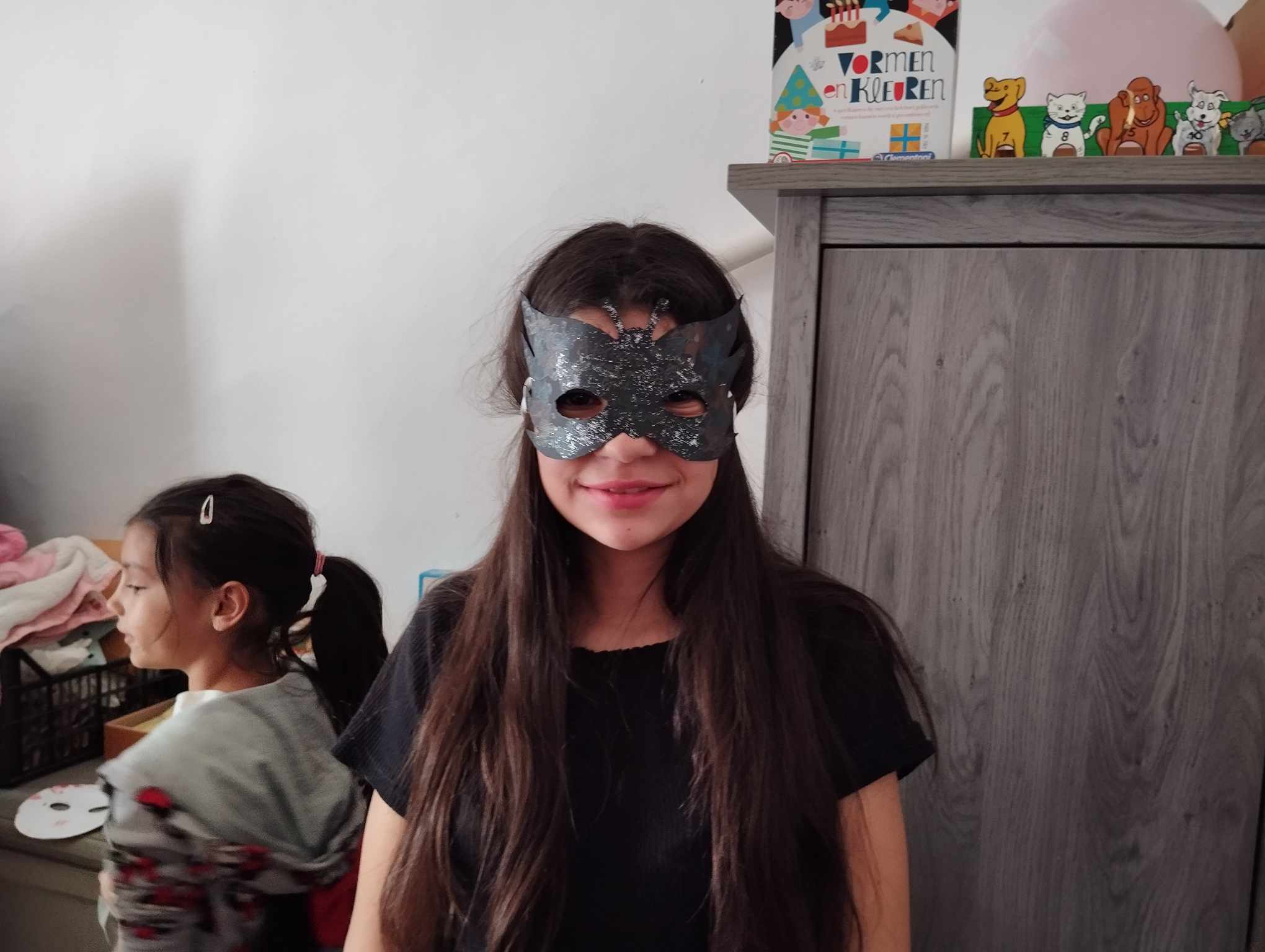
Only children took part in the program, so it was not possible to contact their parents directly at the event or even maintain already existing relations. However, the professional staff hopes that the positive experiences brought home by the children will increase trust in the 4IM project. The organizers welcomed thtat children did not feel tense and opened up easily during the carnival.
The Tetemvár program was divided into two separate events. Together with the Presence point of the Hungarian Maltese Charity Service operating in the target area, they organized a craft activity for the local children before the carnival, so that they could participate in the festive event with their own masks and costumes. For this, the necessary material and tools were provided for the 10 participating children and 3 parents.
After that, the actual carnival event was organized at the Presence point, which was opened by a children's costume parade, followed by playful tasks, and in the meantime, guests were also treated to donuts - courtesy of the Hungarian Maltese Charity Service.
The outreach to the community was helped by the fact that in addition to around 20 children, around 10 adult chaperones also participated in the program.
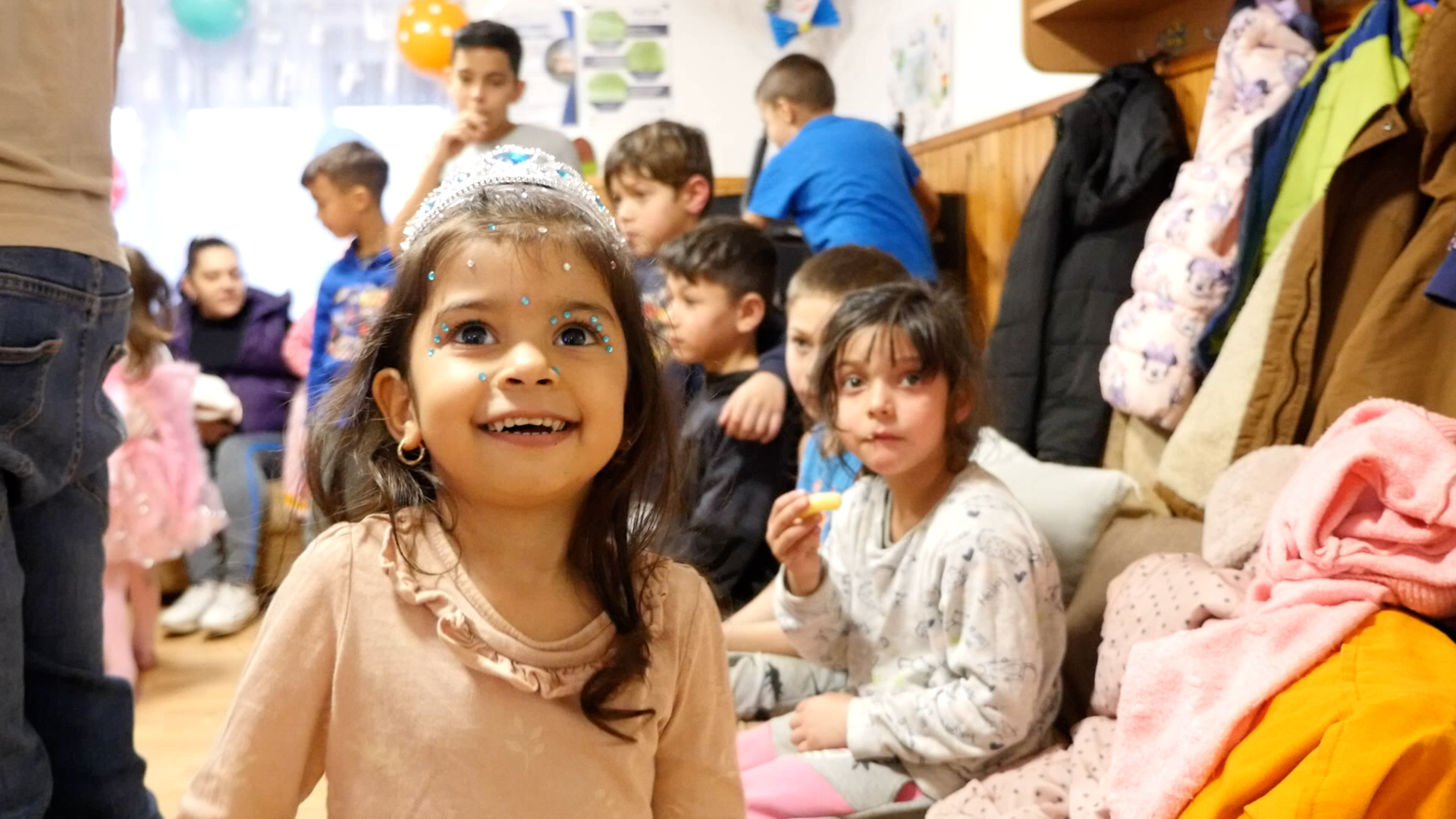
Overall, it can be said that the carnival events were successful from both a professional and a social point of view.
Back to school after the field trip
With the help of the 4IM project, one of the young residents living in Tetemvár who previously failed to acquire a profession now has the option to continue his studies. Thanks to the project, he got to know the workshop school program of the Vocational Training Center in Miskolc.
One of the important professional foundations of the 4IM project is that employment is one of the most significant factors in social integration. That is why the staff organizes several programs for the people of Miskolc living in Tetemvár and Bábonyibérc, which promote employment in some form.
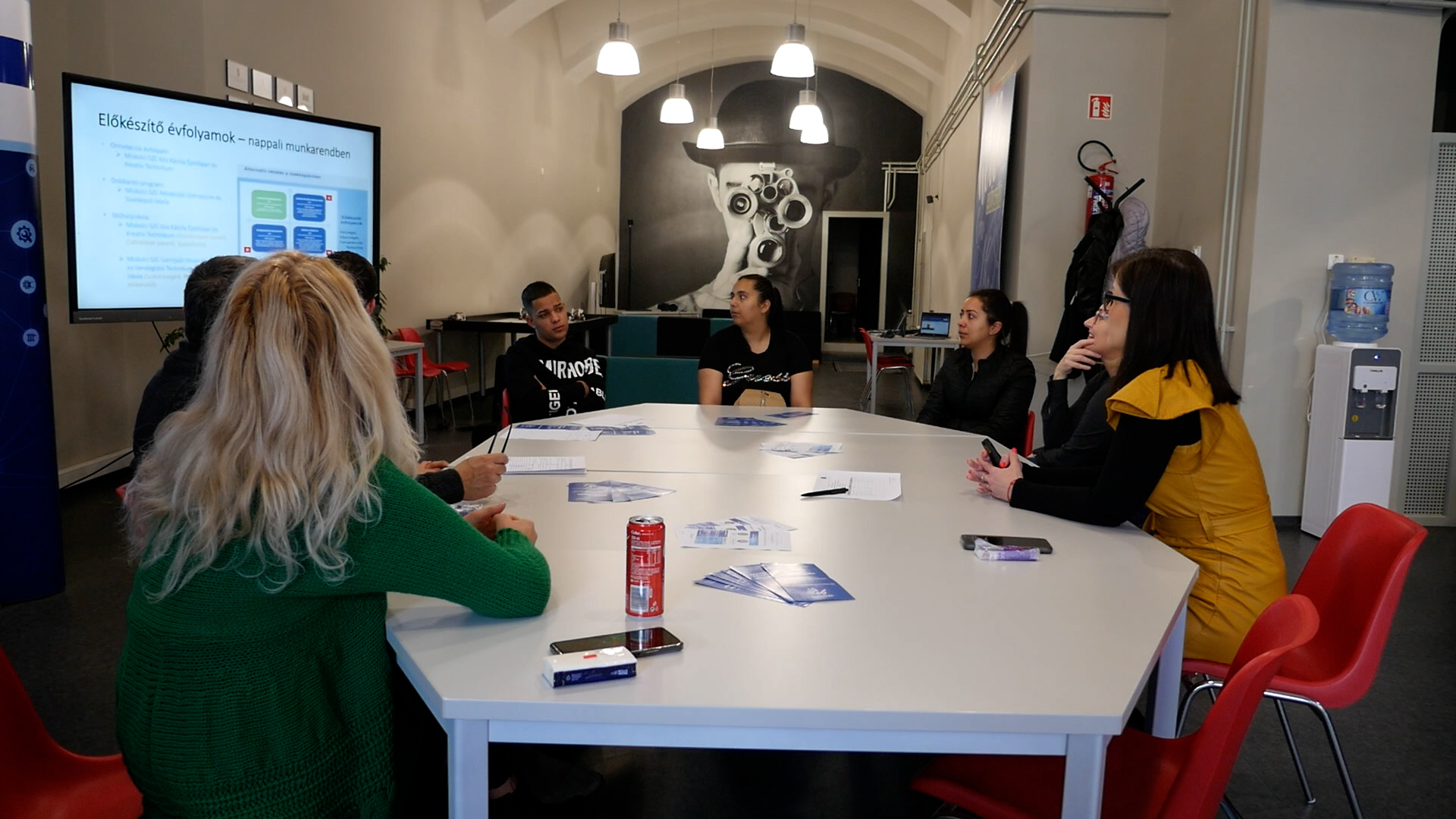
In the past, there were various trainings that - among other things - aimed at promoting reintegration into the labor market, or visits that meant to inspire with practical examples. The latter category previously included a visit to the "Tű, cérna, szeretet" factory of the Hungarian Red Cross Borsod-Abaúj-Zemplén County Organization, or to the Training Information and Experience Center of the Vocational Training Center in Miskolc.
During the latest visit to the Training Information and Experience Center in mid-February, the staff of the 4IM project - in cooperation with the Miskolc Vocational Training Center - wanted to show vocational training alternatives to the residents of Tetemvár and Bábonyibérc who do not yet have a profession yet.
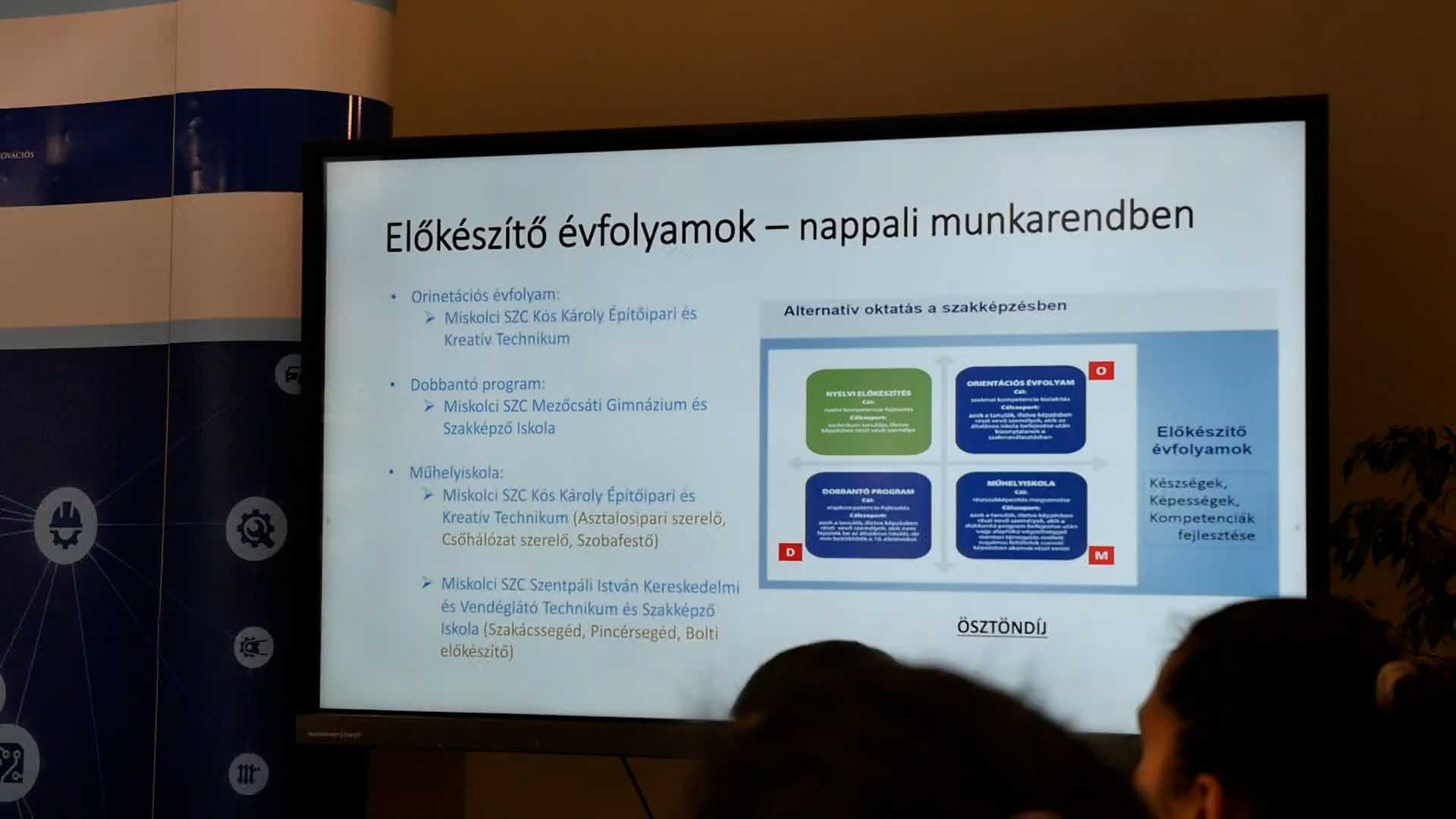
The field trip went so well that a young man who had not previously completed his studies as a room painter saw the opportunity in the center's workshop program. By completing the training, he might acquire a semi-profession in up to 6 months, which significantly increases his chances of finding a job on the labor market. He will soon visit the Károly Kós Construction, Creative Technical and Vocational Training School in Miskolc, where - if he decides so - he can continue his abandoned studies with the help of the 4IM project.
January 2024
Meeting of the Social Innovation Council
The main topic of the end-of-January meeting of the professional advisory board established as part of the 4IM project was the results of the research conducted as part of the program. The experiences were presented by the research leader representing the University of Miskolc, then the experts reflected on the ideas.
With research leader Zsuzsanna Török, specialists from the University of Miskolc assessed demographic conditions, infrastructural accessability and the social network typical of Bábonyibérc and Tetemvár, using the results of 50-50 household-level and personal questionnaires.
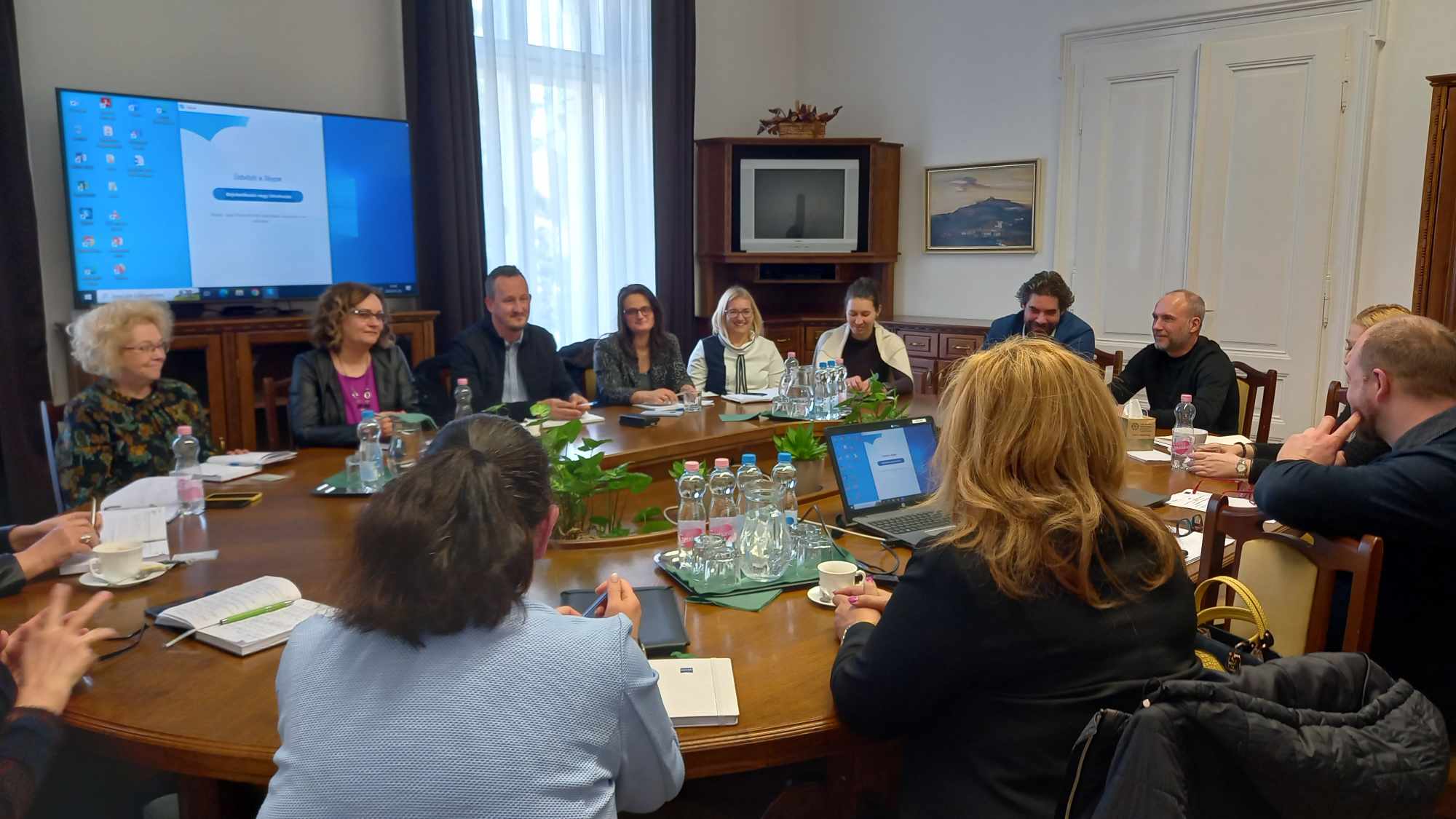
Based on the results, a so-called "well-being index" was developed based on quantifiable data: the individual's well-being index is shown on a 200-point scale through the subjective categories of health, economic factors, education, social relations, security and protection. This can be a generally applicable descriptive indicator that can help extend the results of the 4IM project to areas of the city with similar parameters.
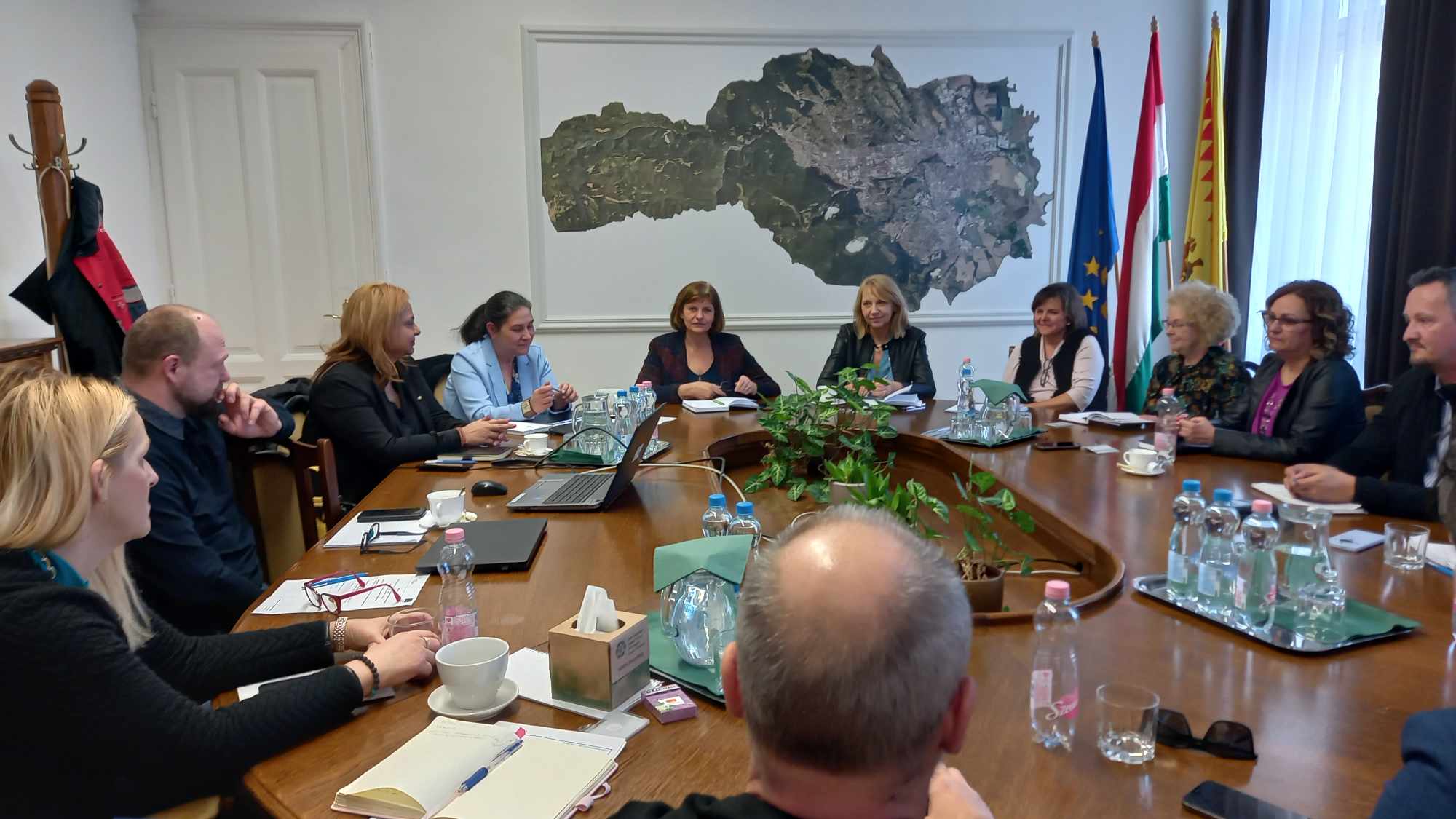
After the research presentation, the members of the Social Innovation Council agreed that the well-being indicator could be useful in the distribution of the social service packages of the city of Miskolc. At the same time, it was also determined that further research is necessary for progress.
They inspired job seekers through practical examples
The Social Innovation Resource Center organized a factory visit for a total of seven women from Tetemvár and Bábonyibérc. Residents of Miskolc interested in employment - thanks to the 4IM project - visited two "Tű, cérna, szeretet" sewing workshops of the Borsod-Abaúj-Zemplén County Organization of the Hungarian Red Cross. The program wanted to set a good practical example for job seekers.
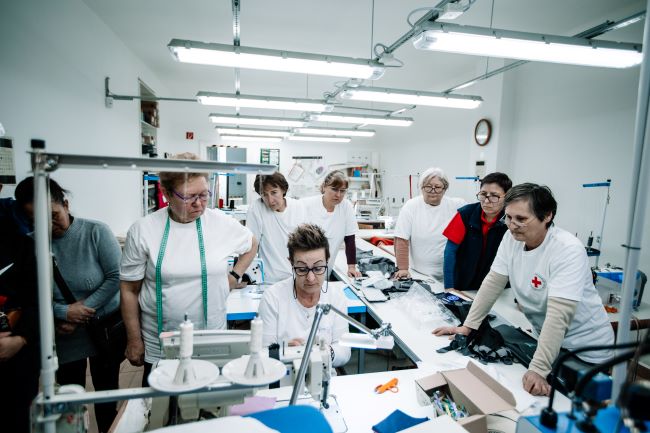
One of the basic professional goals of the 4IM project is to improve the living conditions of the residents of Miskolc living in the two districts that are to be developed through employment.
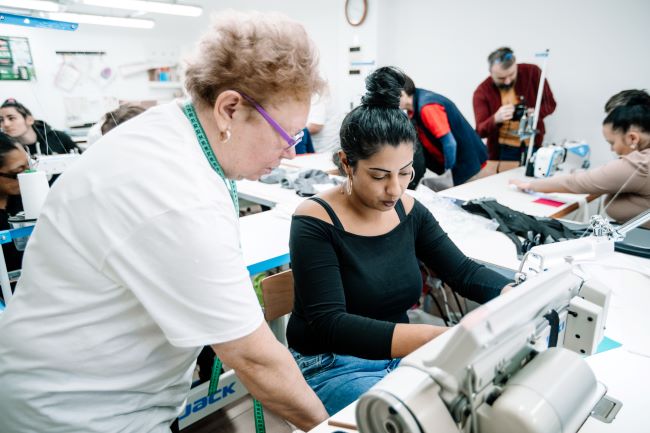
The Social Innovation Resource Center tries to achieve this through several means: between September and December 2023, community coaches and professional staff, in cooperation with partner organizations working in Bábonyibérc and Tetemvár, helped the labor market (re)integration of 49 residents of Miskolc with various methods. Among other things, by compiling a resume that meets the needs of the age, and with various trainings that help learn job searching techniques
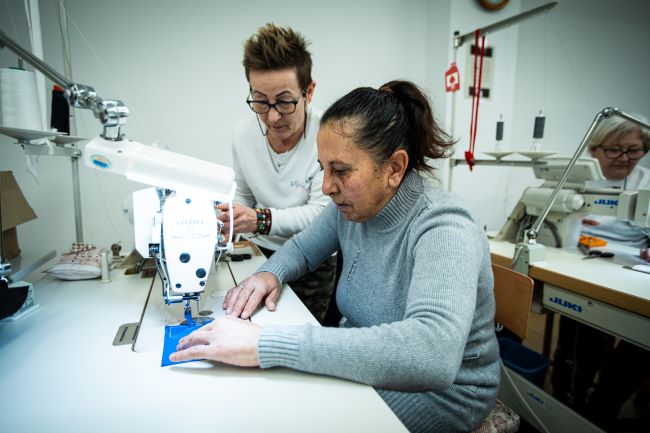 .
.
The professional staff of the Resource Center considers it important that, in addition to developing individual skills and abilities, the people of Miskolc living in Bábonyibérc and Tetemvár also meet good practical examples. In this spirit was, the January 26 visit to the two locations of the Hungarian Red Cross Borsod-Abaúj-Zemplén County Organization "Tű, cérna, szeretet" organized.
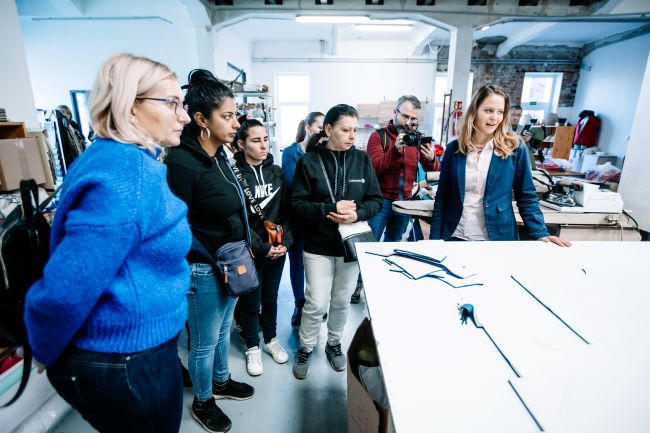
Women interested in employment gained work experience by getting to know the sewing work processes. They made an aroma pillow, which they then took home with them as a beautiful memory. One of them proudly remarked: "They won't even believe back home that I made this!".
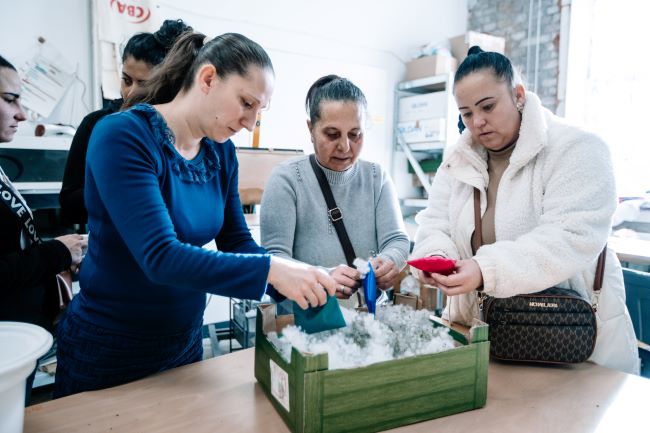
The staff of the Resource Center considered the visit so successful that they are already planning the next one.
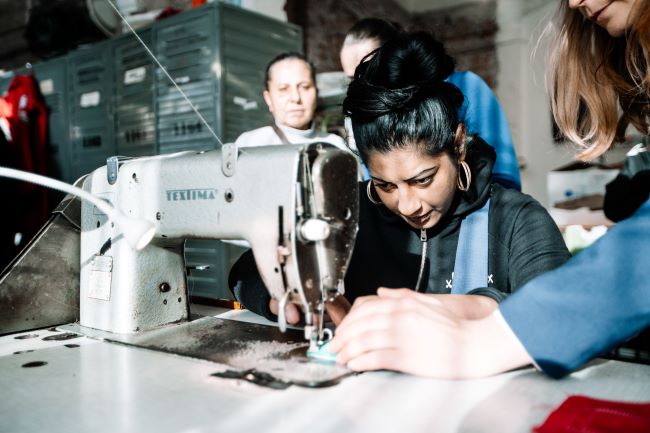
Islands of cooperation and hope in Miskolc
Poverty has been a long-standing problem in Miskolc, and experts agree that it affects an increasing proportion of the population. Rehabilitation of deprived neighbourhoods and the integration of their inhabitants into society is one way to combat it. The Central European city has won a grant from the European Union to develop potential solutions that focus on the integration and active participation of local population. Under the motto “Miskolc shall be a place for everyone”, the 4IM project aims to create opportunities for the development of underprivileged neighbourhoods and to help residents re-enter the labour market. The project focuses on two neighbourhoods: Tetemvár and Bábonyibérc, once thriving parts of the city that have since suffered from chronic poverty in the face of Miskolc’s steady deindustrialisation over the past decades. Through the project and the municipality’s efforts, these neighbourhoods have been turned these into tiny islands of hope for the city.
There are around 10,000 people living in the 16 districts of Miskolc in need of development, of which around 1,000 live in the areas selected for the “Miskolc shall be a place for everyone” project. The city’s rehabilitation plan provides an opportunity for residents of Tetemvár and Bábonyibérc to improve their living conditions via community engagement, outreach activities, improvement in the delivery and access to social services, and employment-promotion opportunities.
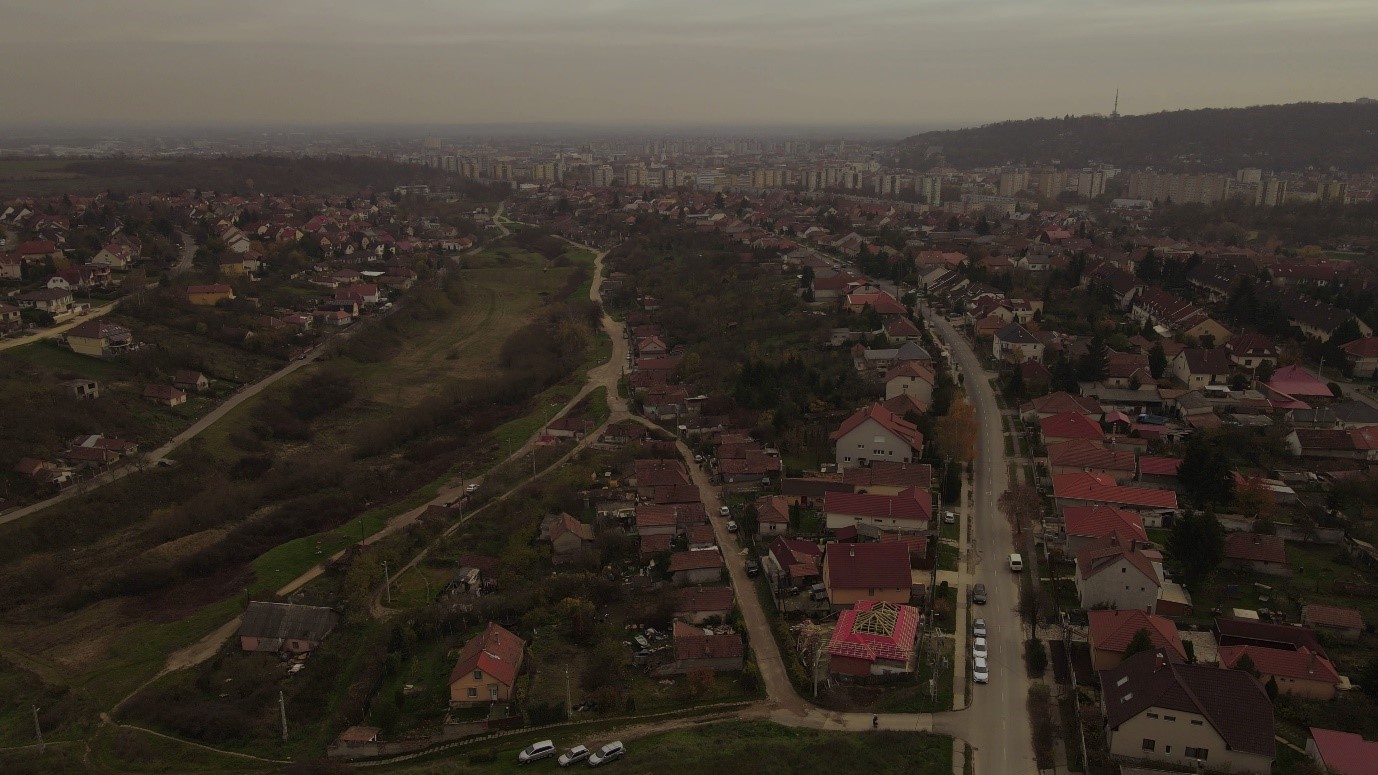
Tetemvár and Bábonyibérc
Miskolc was part of a network of wine-growing farming towns stretching from Gyöngyös to Tokaj-Hegyalja. These cities were once the most important links in the chain of settlements in the zone where the North Hungarian Mountains and the Great Plain meet.
Historically, Tetemvár and Bábonyibérc have figured among the 14 vineyards recorded in Miskolc. The former was the smallest nonetheless, its importance was manisfest shown by the fact that in the 18th century, the Greek Catholic bishop kept a wine-cellar there, among more than 300 others. Both districts were characterised by huts built next to the cellars by the locals which illegally offered food and drink and created a sort of rural slum. In the central valley of Bábonyibérc the Bábonyibérc-Újtelep housing project was established to house people in difficulty. After the First World War, most of its inhabitants – including refugees – lived in poorly-equipped, government-built huts that dotted the banks of the Pece stream.
Although the wine cellars of both areas played an important role in the social life of the citizens of Miskolc in the first half of the 20th century, the neighbourhoods became increasingly a hub for marginalised people.
Struggle out of hopelessness
“The difficulty with the development plans for these neighbourhoods is that no accurate official statistics for these parts of the city are available. Both districts have a predominantly disadvantaged or severely disadvantaged population. Additionally, there is constant movement in and out of the two neighbourhoods which makes working there exceptionally difficult” says Andrea Krank, head of the Resource Centre, an organisation set up by Miskolc to tackle the problem.
The people living in Tetemvár and Bábonyibérc have openly expressed that they feel worse off than those in other parts of the city: despite their proximity to the city centre residents have consistently had difficulty accessing basic public services – including health services, ambulances, etc. Paradoxically, they find it difficult to integrate into mainstream society despite their geographical proximity to the downtown area.
Few people participate in formal education and those that do frequently drop out before finishing. This has a profoundly adverse impact on their ability to access the job market as they lack not only the technical but also the social skills required to function in the workplace.
As part of the project, professionals will build contacts with local residents to assess the depth of the problems. One of the most pressing underlying issues in the two neighbourhoods is housing.
“Talking to the local population has shown that in nearly all households there is the desire to leave. Their life is made even more difficult by the fact that official ownership of most of the properties remains unclear, exacerbated by the very low market value of the houses. This makes many people’s dreams of creating better, safer and more secure housing for their families hard to realise, but we are here to try to keep that hope alive,” says Andrea Krank.
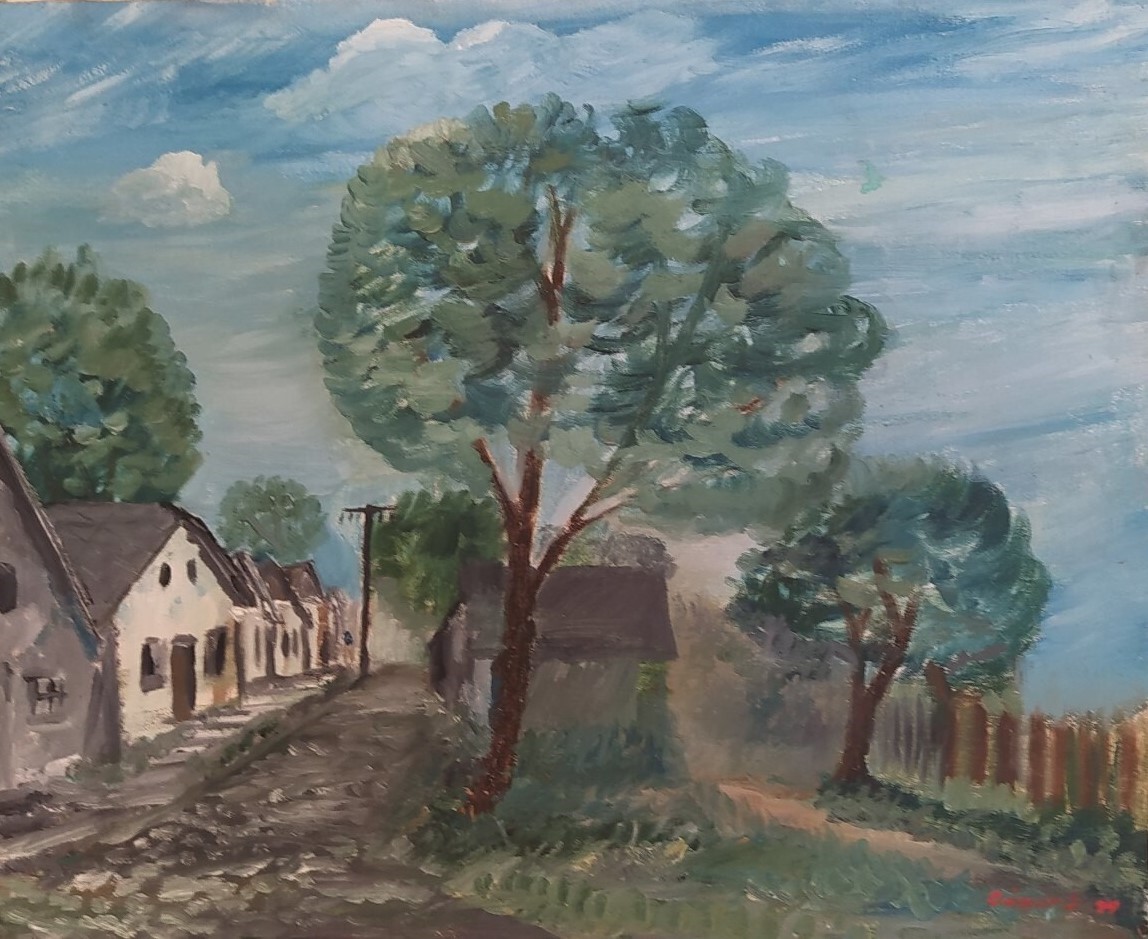
The centre of hope
In an initiative that is still a novelty in Hungary, a “Community Coach” has been invited to set up territorial working groups in both districts. These groups are made up of local residents, social workers, municipal representatives, a family support worker, a case manager, field workers and other NGO staff.
The Resource Centre, consisting of 11 professionals, coordinates the field work by targeting the key problems of the two neighbourhoods. One of the main objectives of the Centre is to build support, and maintain the motivation of local residents to encourage them to take action for themselves at community level. The Centre’s long-term mission is to improve the quality of life and increase employment-opportunities.
Krank concludes: “The Resource Centre has achieved promising initial successes in community-municipality cooperation. Trust and relationships with local people have been established whereby professionals have developed service packages tailored to the needs of the households. We work as a team to connect and coordinate the services of utility providers, municipalities and NGOs, so that professional assistance and problem-solving moves faster and becomes more efficient. Another recent success is the launch of employment counselling which has helped numerous local residents find jobs.”
Poverty is not just a question of money
Social innovation unique in Central Europe alive in Miskolc: an interview with the Deputy Mayor
No municipality in Hungary goes untouched by poverty. In 2021, the leadership of Miskolc chose to face the problems affecting the city via a social innovation plan based on the idea of “Miskolc shall be a place for everyone” an EU-financed project the city is currently implementing. Andrea Varga, Deputy Mayor of Miskolc, responsible for human services, on the special urban development effort, is featured in the below interview.
There are a number of development and social initiatives underway in numerous municipalities across Hungary. What is special or promising about the project you have started in Miskolc and what has the European Union seen in it as innovative?
If we want to have a livable and prosperous city, we have to do something about poverty. The 4IM project is a comprehensive and complex: it addresses old problems using new methods with a strong focus on developing new institutional capabilities. It does not follow a top-down “what to do” approach, but, in cooperation with those living on the periphery, it defines new directions for the development of social and employment services, and for linking and building on them, which we then plan to extend to the entire population of the city.
The 4IM project in Miskolc is one of the 69 pilot initiatives launched under the European Employment and Social Innovation (EaSI) programme as part of the European Social Fund. Nine of these received funding, of which Miskolc is the only municipality of Central Europe to be granted a project. Miskolc has thus become a member of a club where operational experience will be incorporated into the European Union’s policy guidelines and decisions. In other words, we are tasked with building an effective support system that promotes European-level objectives and can be used locally.
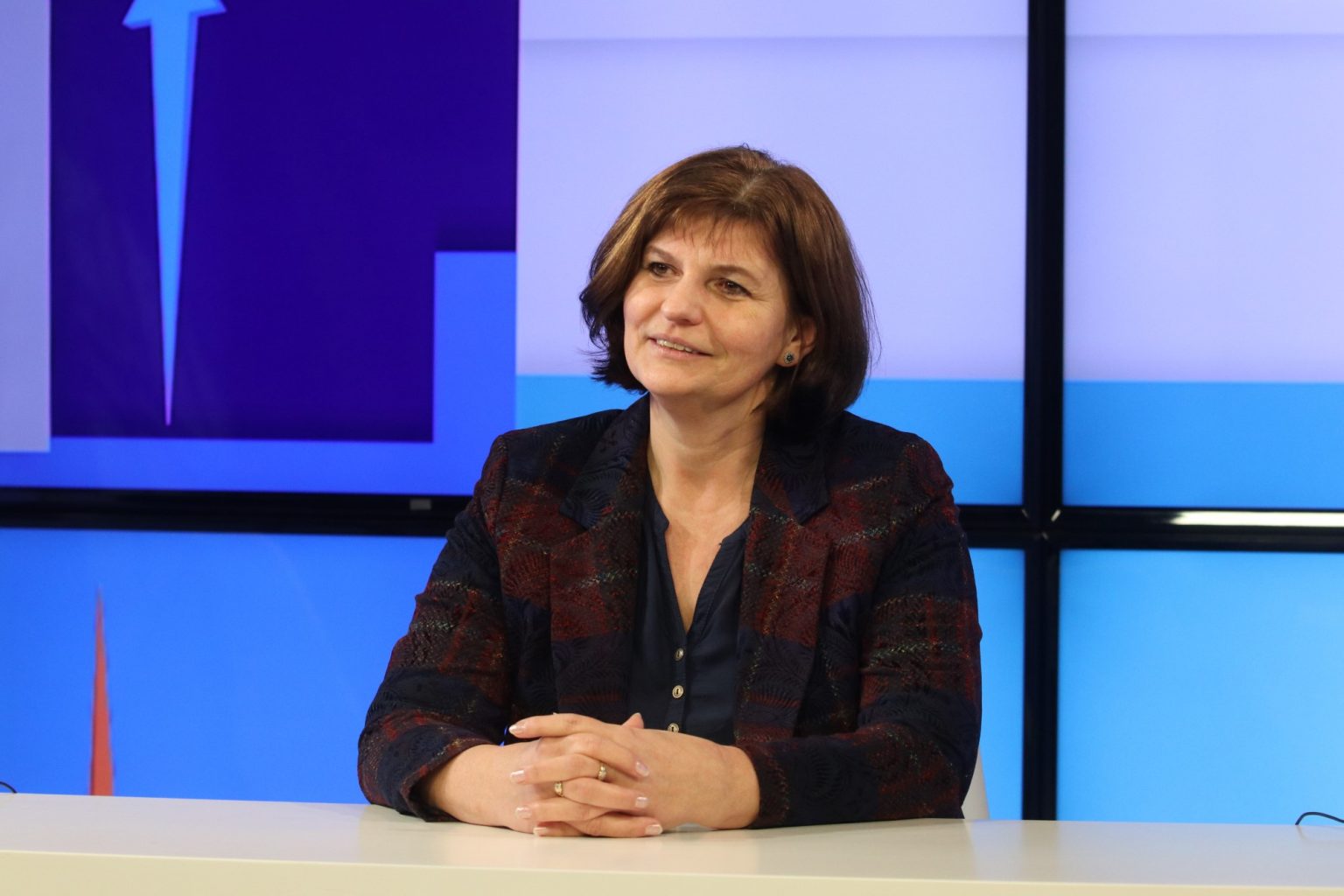
We will come to the old problems and new methods later, but first let us be clear: what is the significance of the project?
At stake is whether or not we have modern public services that live up to the reality of the city and are able to shape it. As a leader of the municipality, my job, together with the experts in the social and employment field, is to think systemically, just like managers of companies that settle here and offer jobs to Miskolc residents. We need to create public and social services that are responsive to the needs of the people; services that can help more of them become independent and autonomous citizens and active participants in the labour market.
Is it not what existing public social services have already been doing?
We have the same legal framework, public service methods, and institutional capacity that we had 20-30 years ago, while the world has changed and is still changing. You only have to think of how the coronavirus epidemic changed our lives and how its effects linger on, but there are also the old problems that our existing service systems could not solve, or could not do much about. Life changes, needs and challenges change, regulations and institutional frameworks need to be constantly reviewed and updated.
Let us start with the old problems.
The 2010 census of the Hungarian Central Statistical Office identified 33 below-average, catching-up neighbourhoods in Miskolc with a total population of around 5-6 thousand people. Based on the field work of the city’s social policy and social services professionals, we know that, remarkably, the number of these neighbourhoods has now fallen to 16. A big problem however is that their population has almost doubled, with around 10,000 people now living in these neighbourhoods. We therefore need to find professional and institutional ways to help marginalised people contribute to poverty reduction.
How can this problem be tackled?
We need to see that marginalised and underprivileged communities with complex problems receive via development professionals’ tailored methodologies social and employment services, innovations and interdependent solutions. These groups have fundamentally different experiences of living together, different norms that govern life, and a different sense of community participation in the municipality in which they live as compared to the majority of Miskolc’s residents.
What steps have you taken so far in the project and what have you achieved?
First, in 2019-20, we started a review of our social policy system to see how well it can respond to the challenges of 2021-22-23. Then we started field work to see the reality on the ground and assess the depth and breadth of the problems. For example, we made use of the community coaching toolbox, a methodology that is still new in Hungary.
Is this a new profession? What does the community coach do in Miskolc?
A community coach is a sort of guide who supports communities and organisations by first identifying and then assisting them in achieving their goals. They are a promoter of self-organisation and reorganisation of the local community. They support and mentor interested parties, and in particular those who want to play an active role. Community coaching is a development tool that encourages community members to act together according to their interests and to unleash the potential of individuals and the community to help them break out of extreme poverty. In the 4IM project, community coaches started their work in two of the 16 impoverished neighbourhoods: Tetemvár and Bábonyibérc. The aim of cooperating with them is to learn about local needs and, through dialogue, to learn more about the everyday lives of the people who live there, so as to develop a methodology adapted to their needs whereby social services may be better accessed.
What is the objective of the 4IM project?
It is an institutional development project, through which we can develop new service pathways that can support the people of Miskolc living in disadvantaged neighbourhoods. The goal is to improve their situation and better integrate them into the Miskolc community, including into the world of employment. In Miskolc, we are in uniquely difficult situation that we have a shortage of jobs and a shortage of labour. As Deputy Mayor, I believe that with an appropriate social and employment support system adapted to our social reality, the gap can be closed and companies coming to us will find more able and available labour.
Will there be other innovations in the project?
We are also exploring the possibility of introducing a minimum income scheme. Contrary to popular belief, poverty is not just about not having money, and money is not the only way out of poverty. Minimum income is a non-cash benefit, with the main function of ensuring access to adequate and basic public services, such as health care, childcare, energy, transport and digital communication services, for those who lack sufficient resources. Its function is to make up for what is lacking so that the persons concerned may live a life of dignity. Minimum income is not the same as unconditional basic income, as it is not unconditional. In addition to personalisation, an important part of the minimum income scheme is the cooperation of the person concerned with the designated social and employment services worker. No cooperation, no support. The social benefits are that professionals can learn more about the individuals concerned and identify additional circumstances, such as physical illness or mental blocks, that may have hindered the individual’s ability to work or enter the labour market and, through cooperation, may provide further personalised support to help them to enter the labour market.
How long is the project and what results have you achieved so far?
The project will run for 30 months between November 2021 and June 2024. It is different from any previous programme in that we are helping people in the two selected neighbourhoods understand that they can do something to improve their conditions and that nothing will change without their participation. So, we cooperated with them to set goals and implement small but important tasks together. One such project was the renovation of the staircase in Bábonyiérc. Locals reported that the shoes of children going to school and of adults going to work became muddy in rainy weather, which often led to conflicts and reinforced stereotypical attitudes towards them. Together with them, we renovated the staircase. With such small steps, we can improve human dignity and reduce everyday tensions.. There was also a community streambed clean-up undertaken by the people from nearby neighbourhoods: they joined forces when they realised that they had similar problems and that it was worth working together to do something about them. There have also been children’s meetings with local schoolchildren, which have led to games, theatre visits, gardening activities, and foreign language learning.
What will be done with the lessons learned and experience gained from the project?
We are constantly collecting and evaluating lessons learned. The Social Innovation Council was set up by the Mayor to make concrete proposals to the municipality on what social policy changes are needed. The project also has a geographically more distant impact. With a very similar social and economic present and recent past to Miskolc, the twin city of Košice also plans to use our experience to address its own challenges. We have also given signals to the government on what legislative changes we think are needed at national level.
Kassa is learning the methodology of community coaching from Miskolc
The transfer of the methodology of the 4IM project and the experiences of community coaching in Miskolc between the Hungarian and Slovak cities began at an online professional meeting. The Kassa partners will evaluate the information, and the parties will soon define the next steps of the exchange of experiences.
January 16th was the first occasion of the knowledge transfer, which specifically focused on the methodology of community coaching. As part of the 4IM project, Miskolc and Kassa have cooperated so far, but now the leaders of the latter city's social organizations were able to learn about the innovative method based on the experiences of Miskolc.
During the online consultation, Márta Márczis, the professional leader of the 4IM project, presented the community coaching methodology, while the participants from Kassa introduced themselves and talked about their own relevant projects.
At the end of the virtual meeting, the parties agreed that in the coming period, the professionals of Kassa will examine how community coaching can be applied in their own areas. After that, it is conceivable that the transfer of knowledge will continue with training opportunities.
November 2023
Meeting of the Social Innovation Council
The Social Innovation Council, created as a result of the 4IM project, held its latest meeting on November 29. Katalin Somody, who is involved in the 4IM project as a project manager on behalf of the European Commission, joined the discussion.
The Social Innovation Council was established in June 2023 at the initiative of the 4IM project. The main task of the body of experts is to formulate professional positions on issues affecting the social field. This corresponds to one of the basic objectives of the 4IM project, according to which social services can also be developed through partnerships.
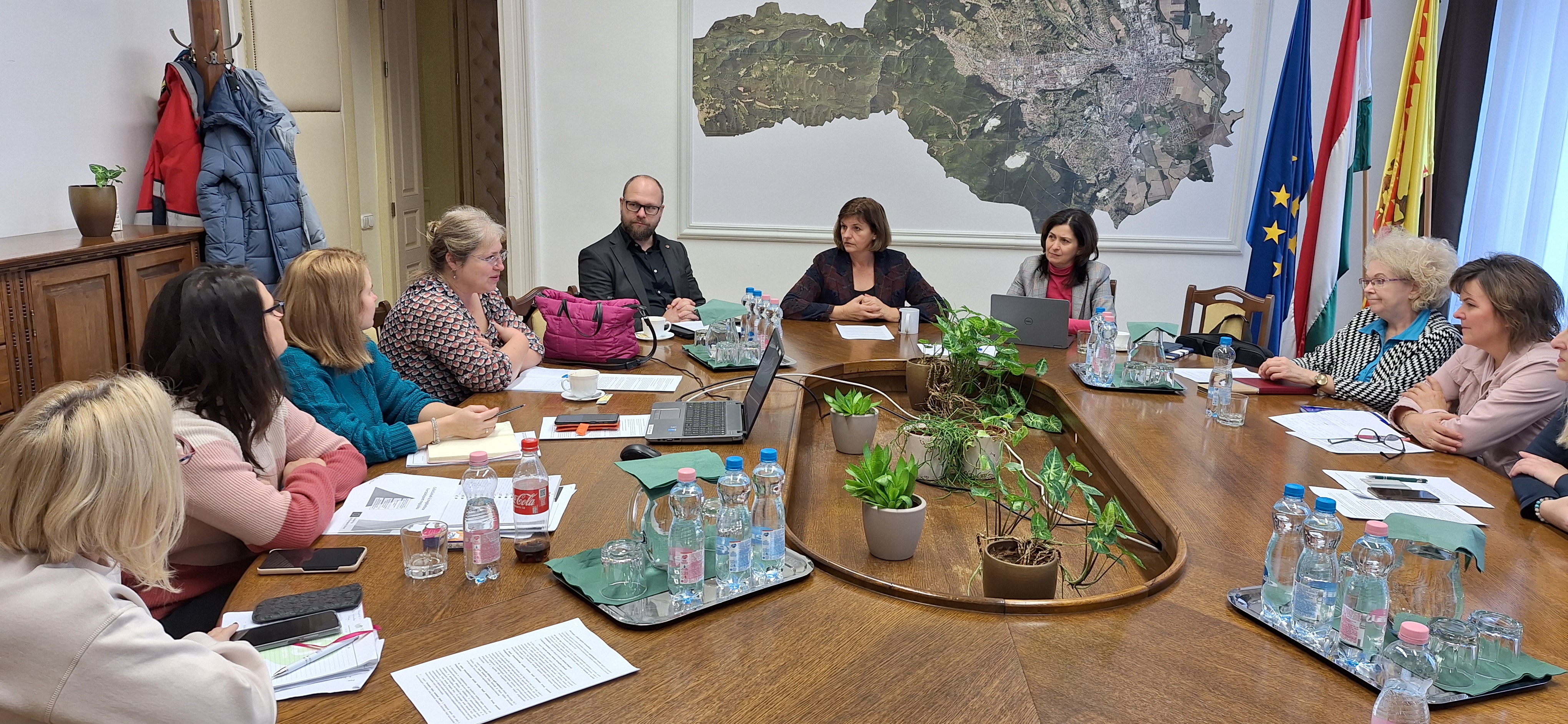
The meeting of the Social Innovation Council on November 29, 2023 was joined by Katalin Somody, who represented the European Commission at the meeting. As the manager of the 4IM project in Brussels, she was curious about how both the program and the Social Innovation Council work.
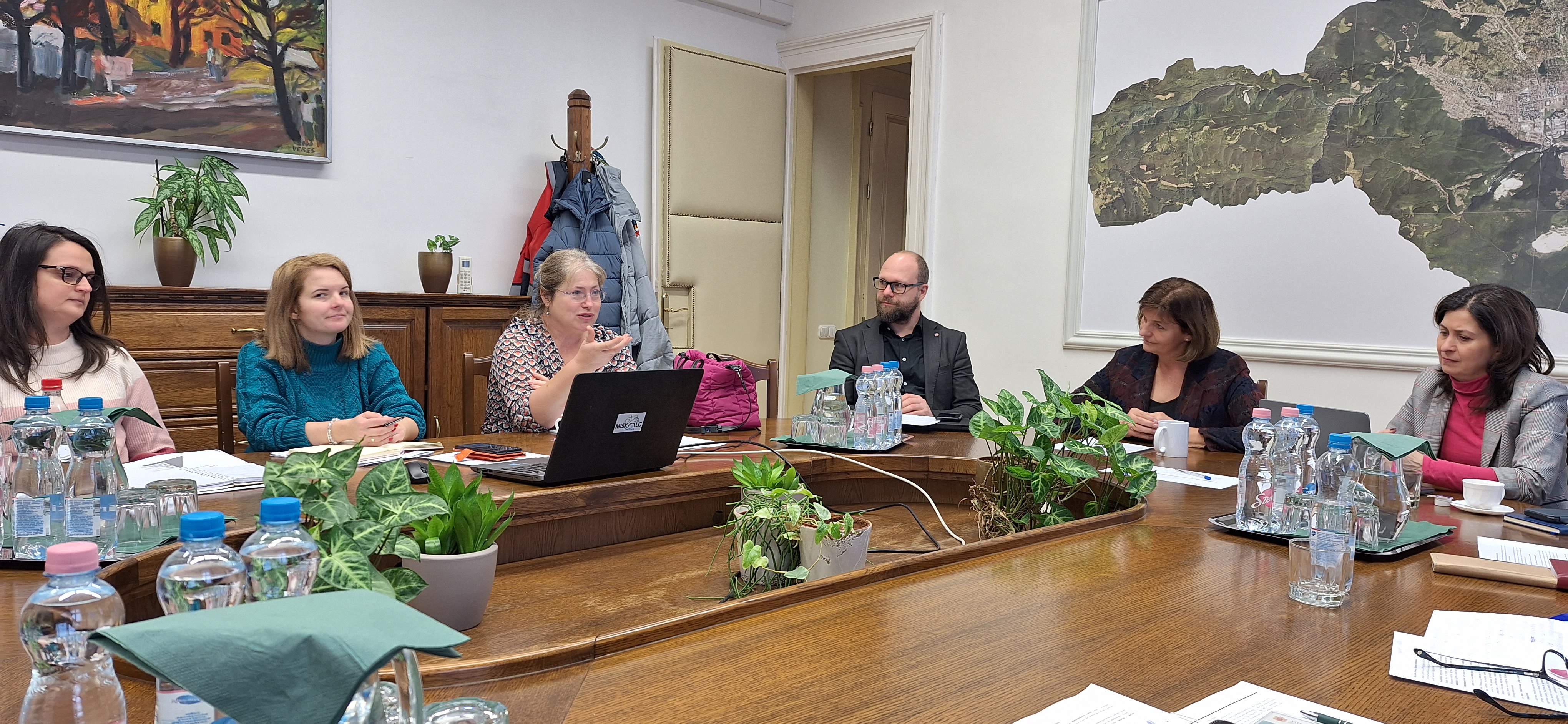
The Social Innovation Resource Center was introduced, with particular regard to field work and the functioning of working groups. The members of the Social Innovation Council also emphasized the importance of cooperation, and at the same time reported their positive experiences with the 4IM project and the operation of the Council.
The 4IM project is a good social innovation practice
Those interested could get to know the work done by the 4IM project at a professional conference presenting new approaches and good practices. The Ministry of Culture and Innovation and the National Contact Point of the National Cultural Support Manager EaSI organized an event on November 28 entitled On new roads.
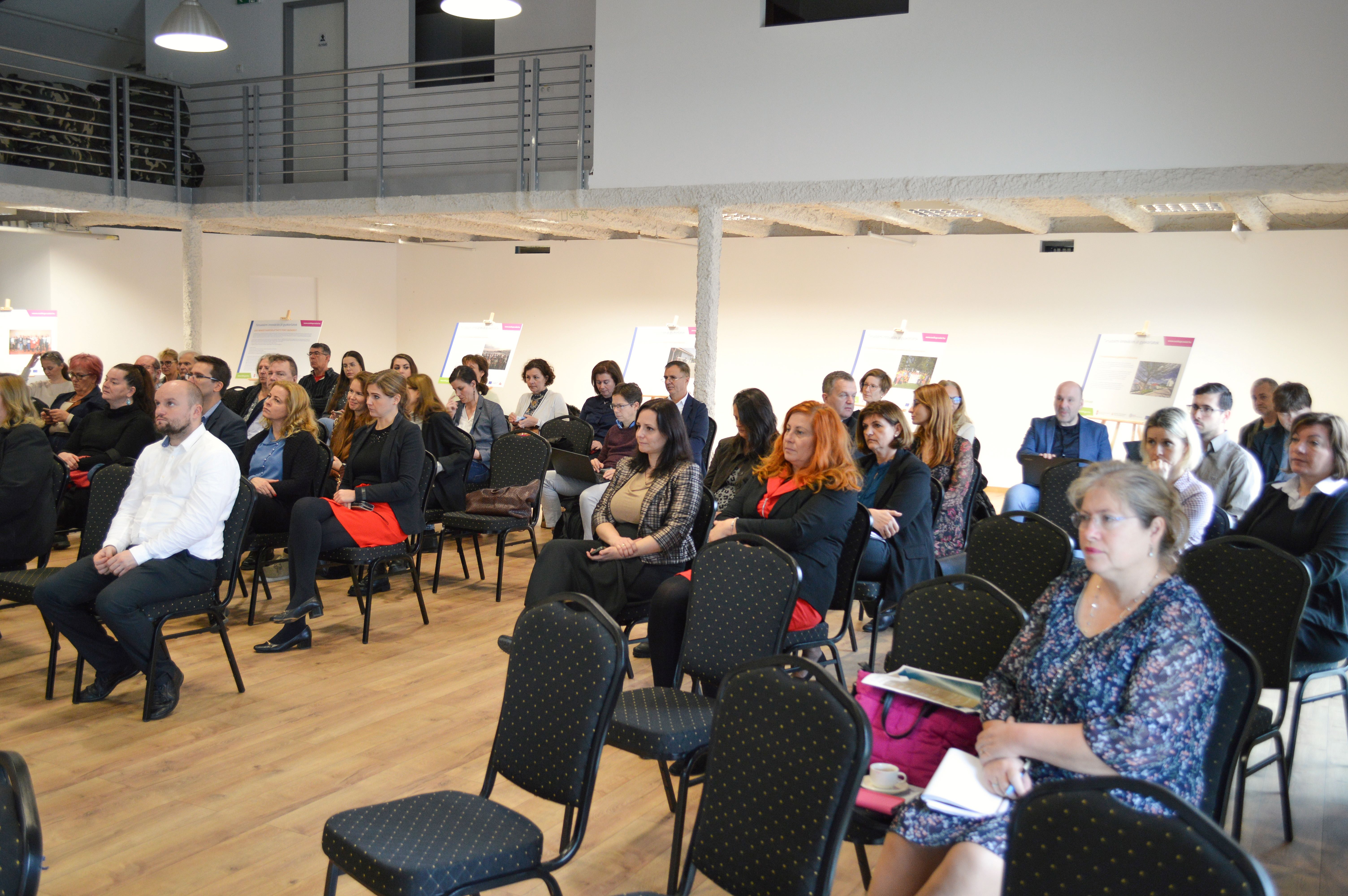
Several innovative projects were presented as part of the professional program. Andrea Varga, Deputy Mayor of Miskolc City, head of the 4IM project, explained the solutions in Miskolc, but the participants could also hear about innovations in Kecskemét and Ipolytölgyes, as well as the model program of the Parents' House.
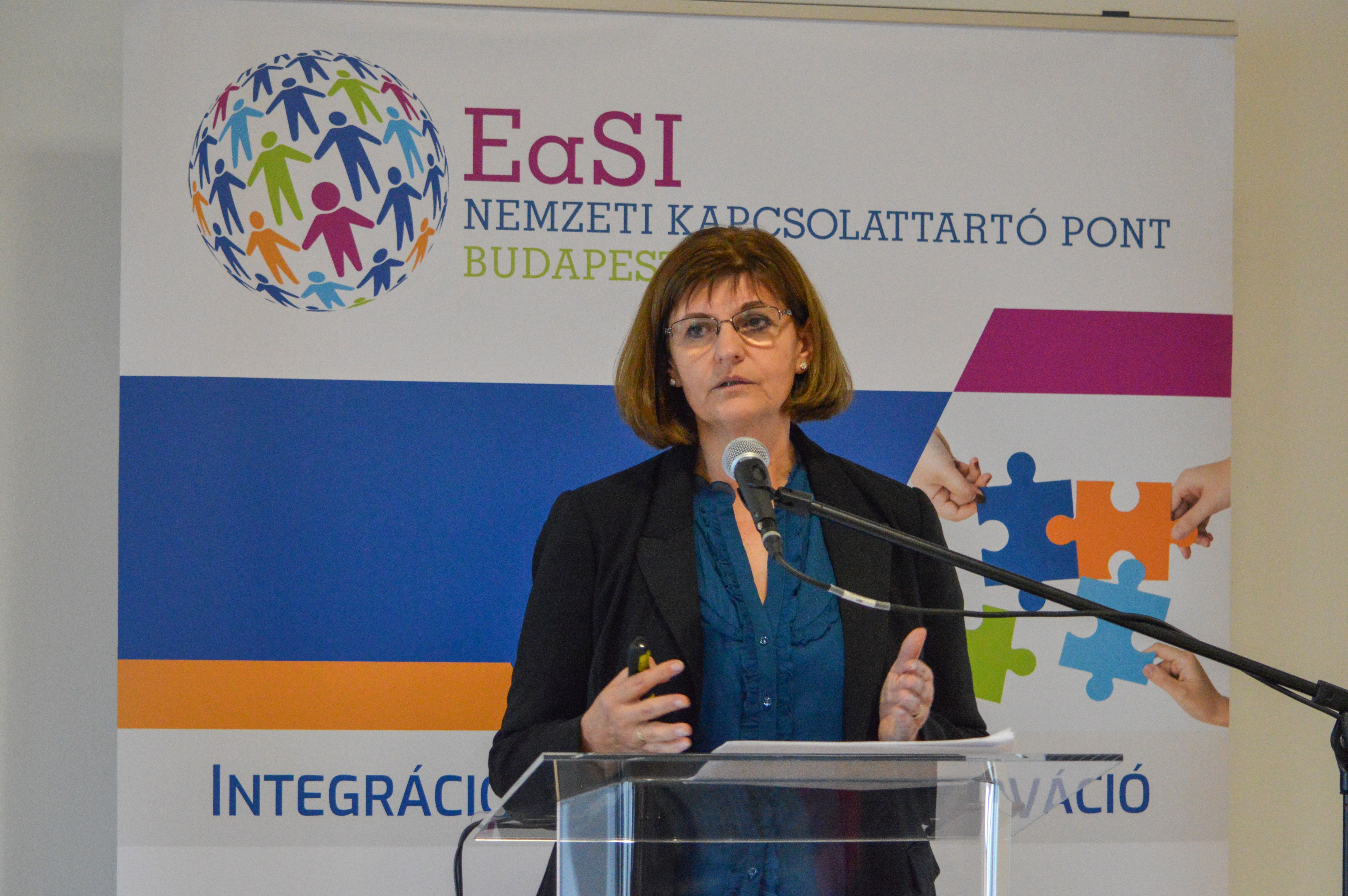
The photos were taken by the EaSI National Contact Point of the National Cultural Support Manager.
The consortium members of the 4IM project met for the eighth time
The consortium partners of the Initiative for innovative integrated interventions in Miskolc - 4IM (Miskolc shall be a place for everyone) project met in Miskolc on November 27, 2023 to discuss the results and experiences of the months since the last meeting. In addition, the tasks lying ahead the project team were also discussed.

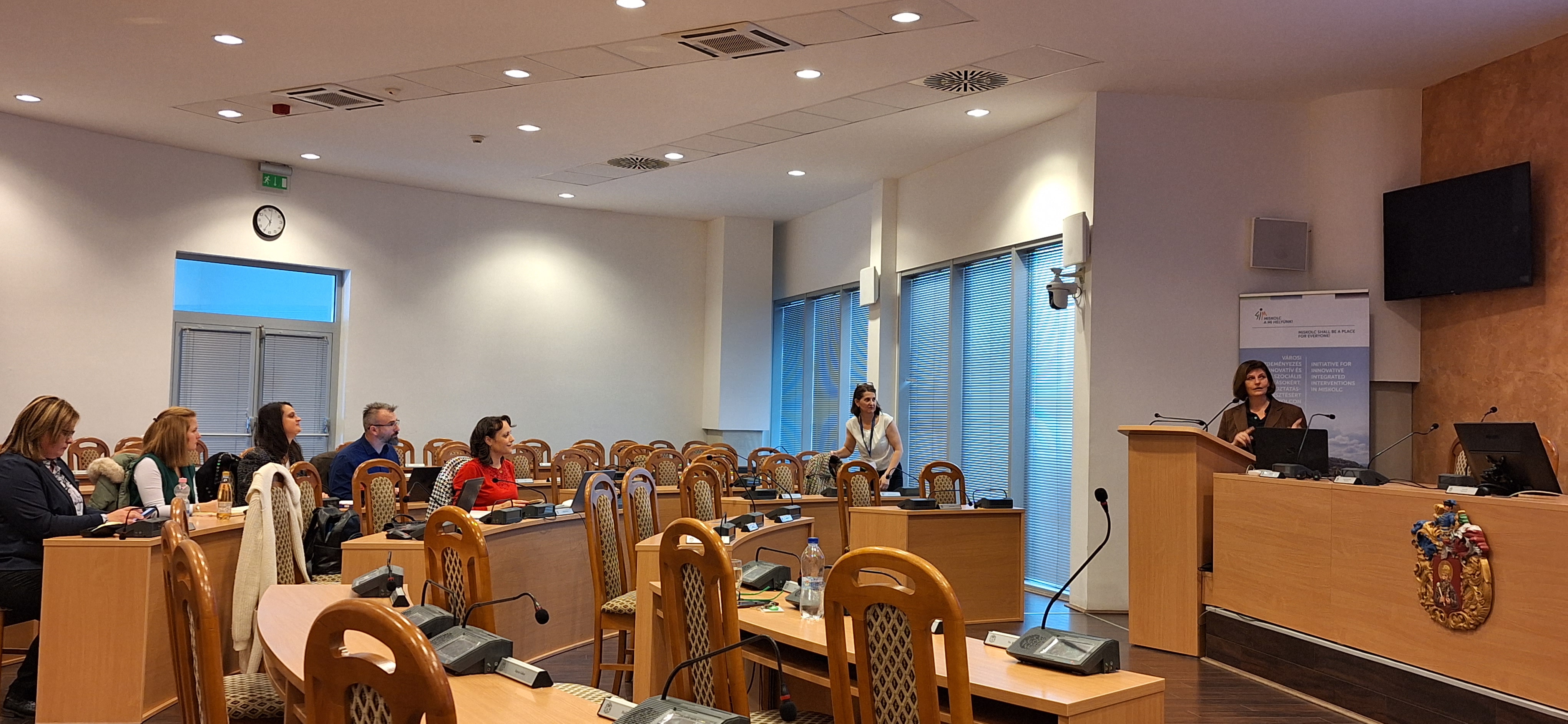
The consortium partners took part in a hybrid meeting at the Mayor's Office of the Municipality of Miskolc, the leader of the consortium.
The parties present in person and online were greeted by deputy mayor Andrea Varga. Afterwards, Dr. Judit Dobák, associate professor at the University of Miskolc, presented the results of the household survey prepared as part of the 4IM project.
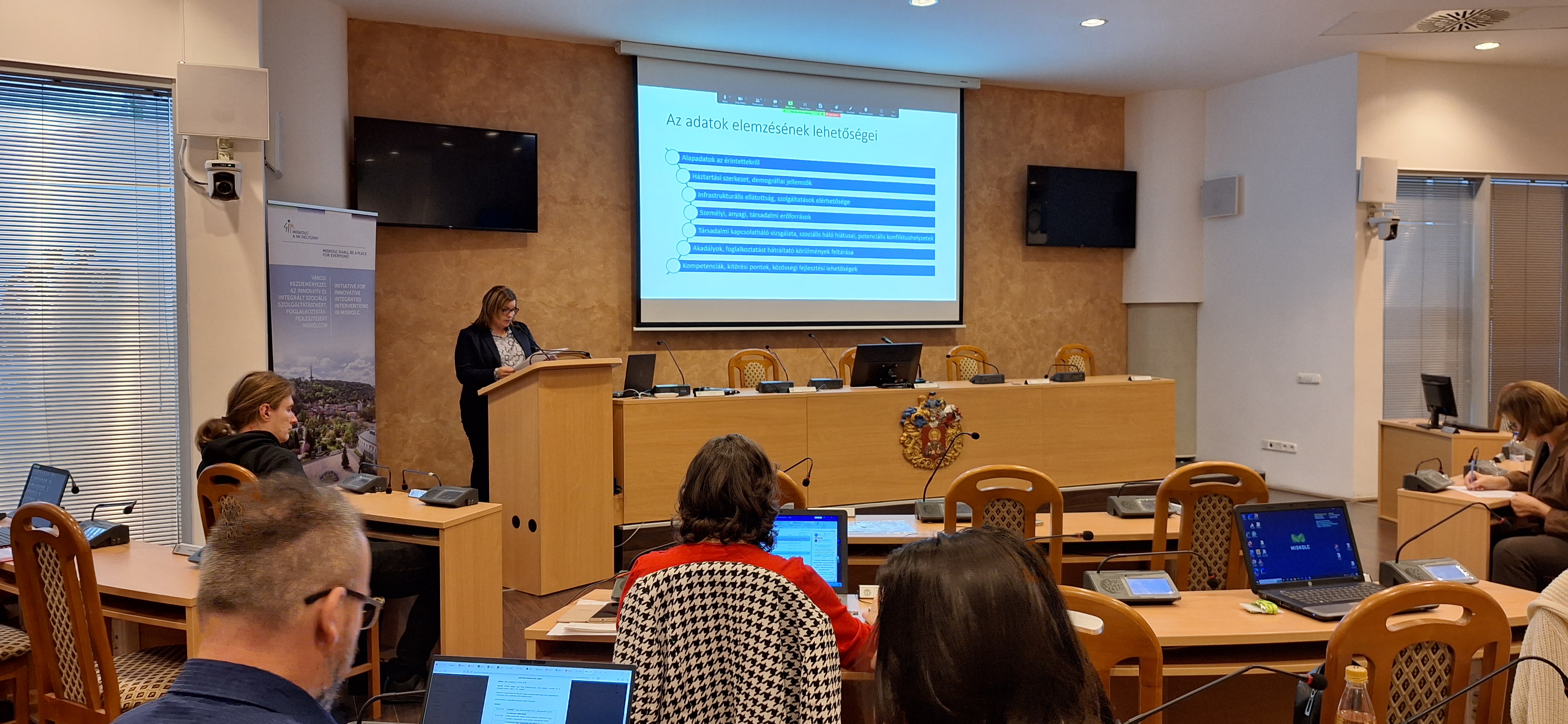
The head of the Social Innovation Resource Center, Andrea Krank gave a presentation to the consortium members about the organizational unit's achievements so far and future plans, with special emphasis on how the work of the Resource Center is integrated into social work.
The consortium members - Abaújrakezdés Közhasznú Egyesület, AEIDL, HÁRFA Foundation and the city of Kassa - reported on the tasks completed since the previous consortium meeting, and then professional coordinator Gábor Osgyáni presented the work plan for the next period. Finally, the management of the 4IM project gave a presentation on the 2nd interim professional and financial report.
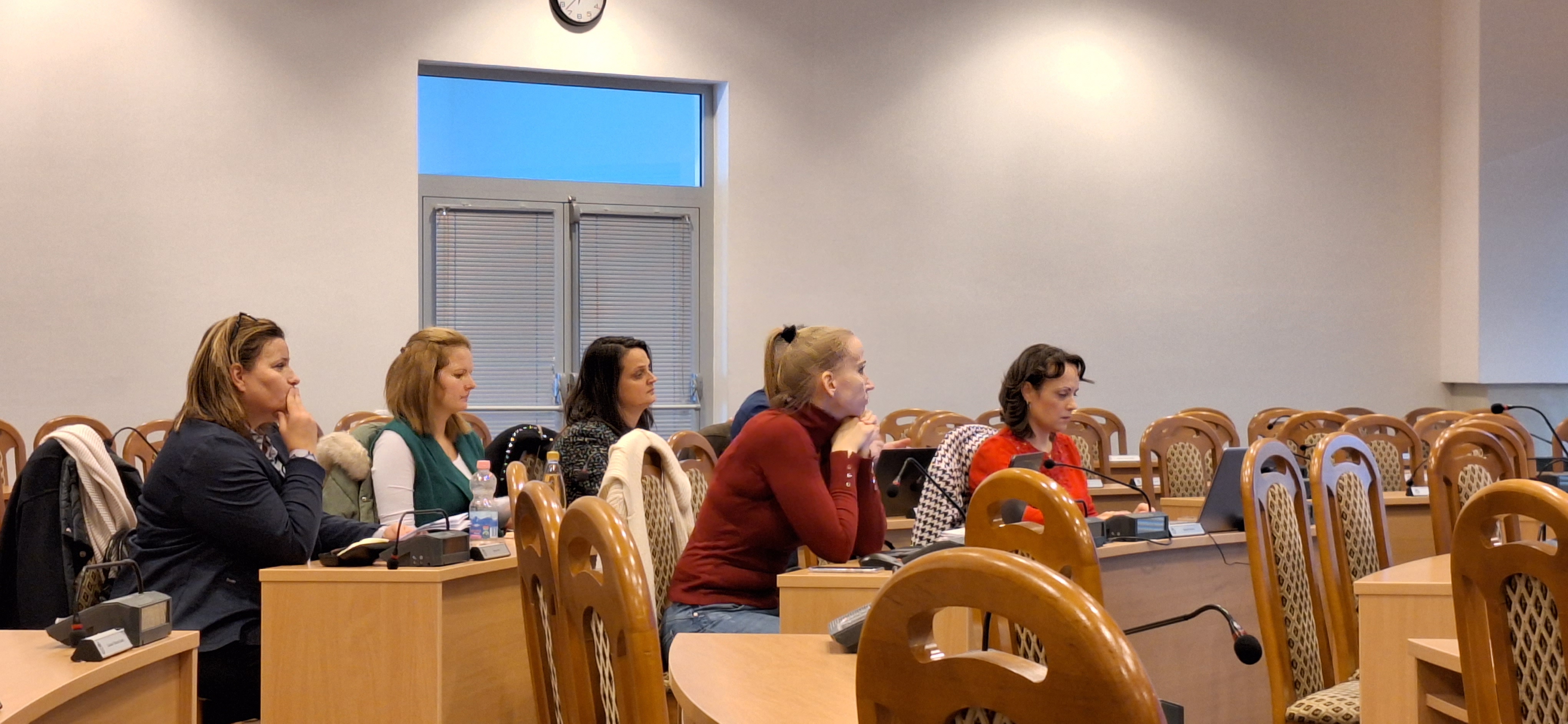
Together with the residents, for a cleaner Babonyiberc and Tetemvar
The 4IM project joined the action organized by MiReHu Nonprofit Ltd. on the occasion of the European Waste Reduction Week. A specialist from the Miskolc waste management company talked to the residents of Babonyiberc and Tetemvar at a community meeting about public cleanness issues. Thanks to the meetings, the locals gained a greater insight into the operation of the waste management system, which knowledge will be of great help to them in their everyday lives.
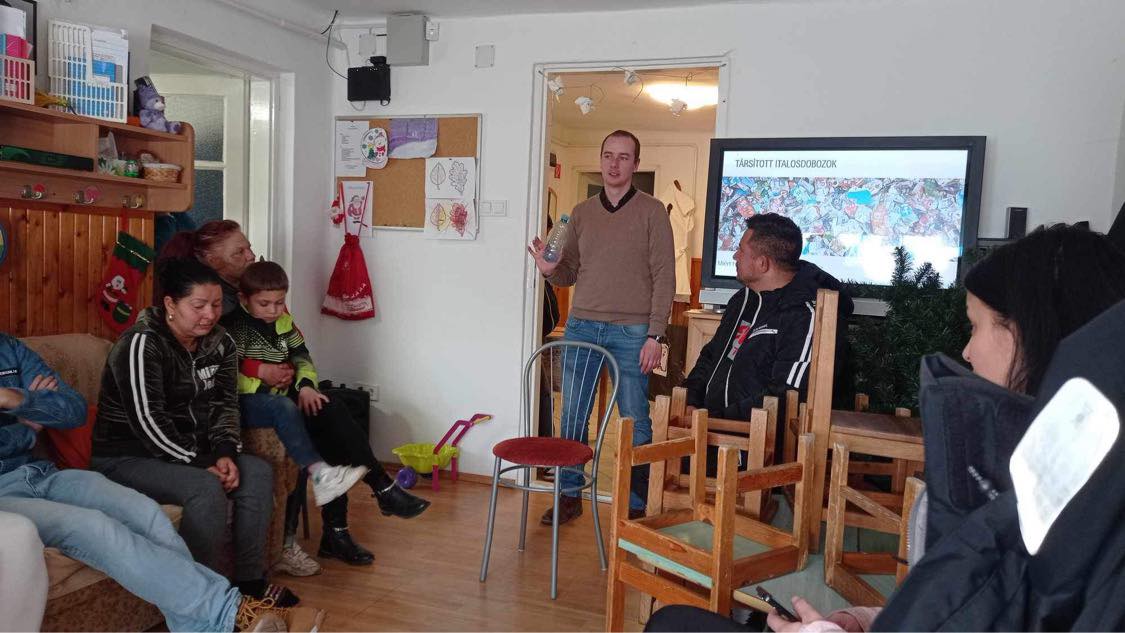
A mutually beneficial community discussion emerged from the community meetings related to public cleanness issues organized by MiReHu Nonprofit Ltd. on the invitation of the 4IM project in two areas of the program.
Among other things, he covered how waste collection, -transport and -treatment works in Miskolc, with a special focus on the selective approach. After the thought-provoking talk, a dialogue developed between the local residents and the specialist. Typically, questions arose regarding how to use or expand the service.
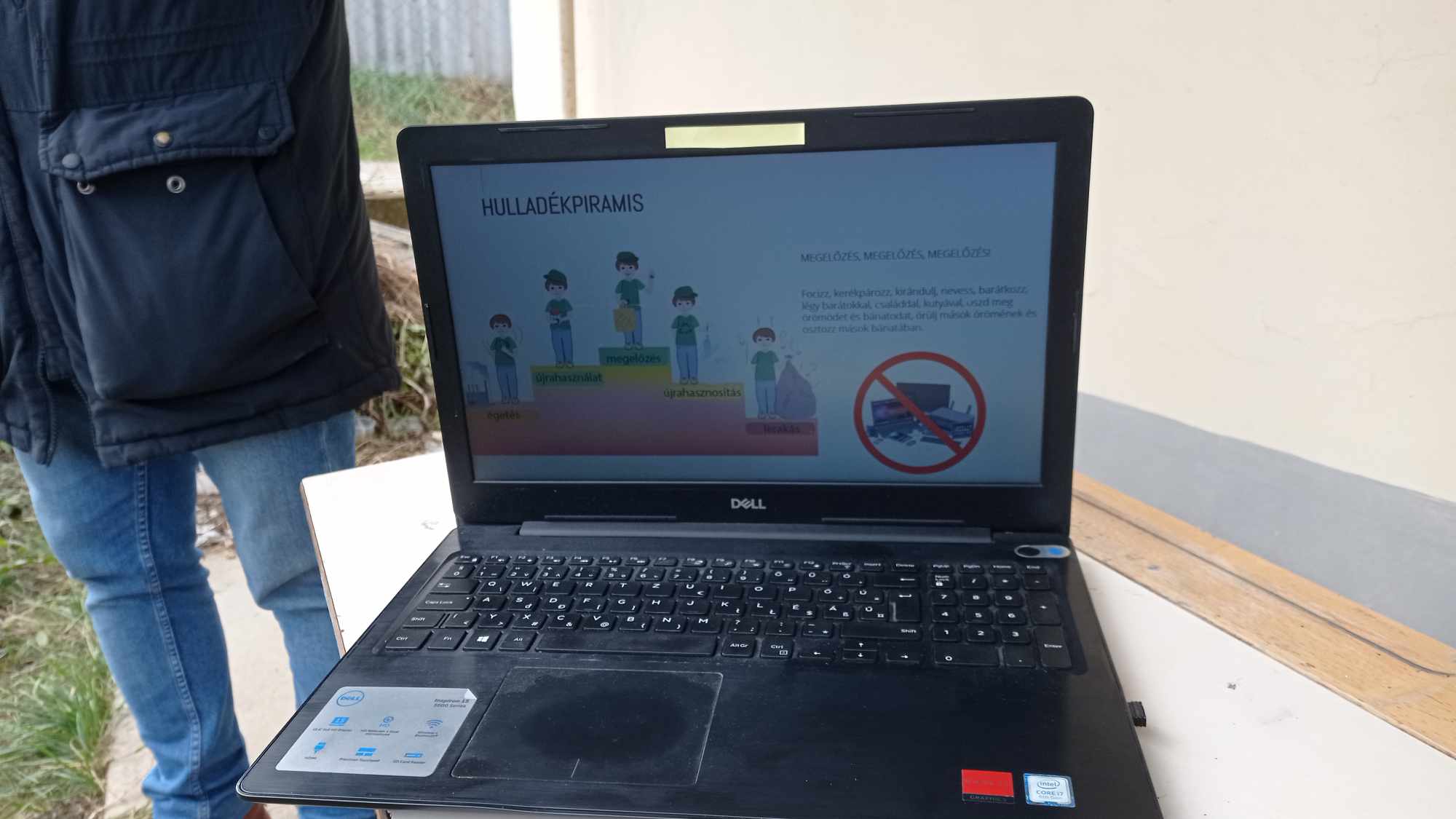
The purpose of the conversation was to exchange fact-based information between the service provider and the service users. This was justified by the fact that - based on experience - several misconceptions about waste collection and transport are spreading in the city districts.
The residents were happy to hear objective information and after the discussions, several of them indicated that they would join the working group that aims to improve the public cleanness situation of the affected neighborhoods, under the coordination of the Social Innovation Resource Center.
By starting the latter - and also with the program detailed above - the 4IM project aims to improve the quality of life of the residents of Babonyiberc and Tetemvar, with the involvement of the stakeholders.
Working to create and innovative social sphere
On November 6, 2023, a professional meeting was organized with the title Partnerships in social work for professionals working in the social field. Details of the 4IM program, which started one and a half years ago, were presented at the scientific meeting. The specialists participating in the project are mainly concerned with the disadvantaged neighborhoods and the catching up of the people living there.
The aim of the project is to introduce new tools into social work that enable integrated social development. The purpose of the professional conference planned for the week os social work was to present innovations on a wider scale. The program of the conference, which targets all stakeholders of the sector, was accordingly put together in such a way that other innovative methods of the sphere were also given the opportunity to present themselves.
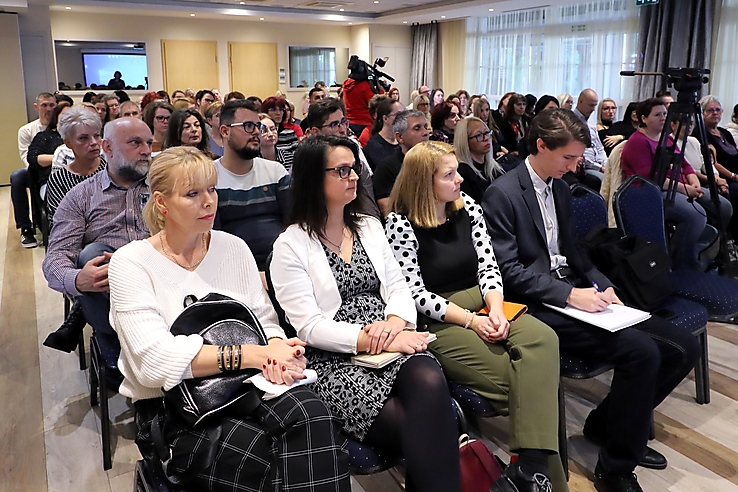
Deputy Mayor Andrea Varga, who welcomed the event, said that the city received EU funds for the implementation of the project in 2021, and that the city's social policy and support systems and services were reviewed since then, and new structures were created - based on the experiences. Today they can reach more people.
- First of all, our goal is to increase employment, and that everyone can move forward on their own - she said, emphasizing the expansion of the usual institutional structures and frameworks.
The deputy mayor added that there is still a population of working age in Miskolc who can receive help from employment counselors - until now there was no service of this type in the social institutions.
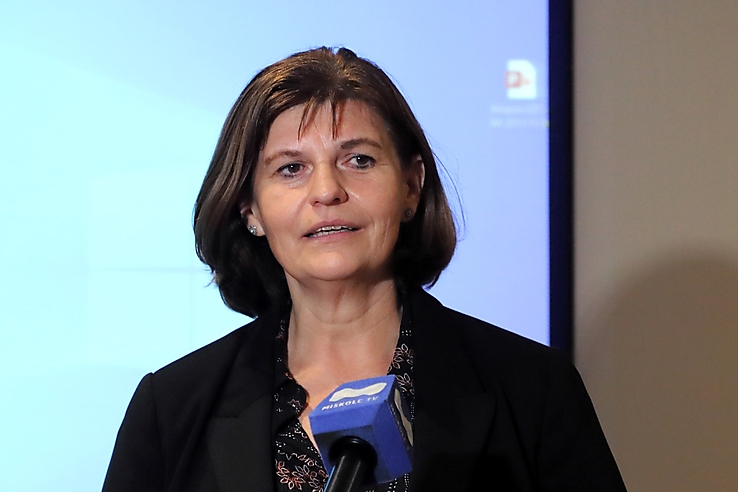
Andrea Varga recalled that the Social Innovation Council has already been established in Miskolc. The group of experts examines how to expand and improve the quality of social benefits and services.
The goal of the conference was that social professionals would find new "tools" that could be used to improve efficiency - this requires courage and innovation, according to the deputy mayor.
It is already a tradition in Miskolc that the Miskolc United Social and Children's Welfare Institute organizes a full-day professional program in the run-up to Social Work Day. Director Attila Péter Gúr said that 4IM implements specific program elements in two areas of Miskolc city - Bábonyibérc and Tetemvár - which can be interpreted as a kind of pilot project and which go beyond the mandatory statutory tasks. The specialists are constantly present in the two mentioned areas, they know the problems from the inside, and they try to involve the affected locals.
- At the same time, we also organize communities. It has been our experience for many years that where a well-functioning community develops, sooner or later, small steps taken with hard work have a much greater yield - he said.
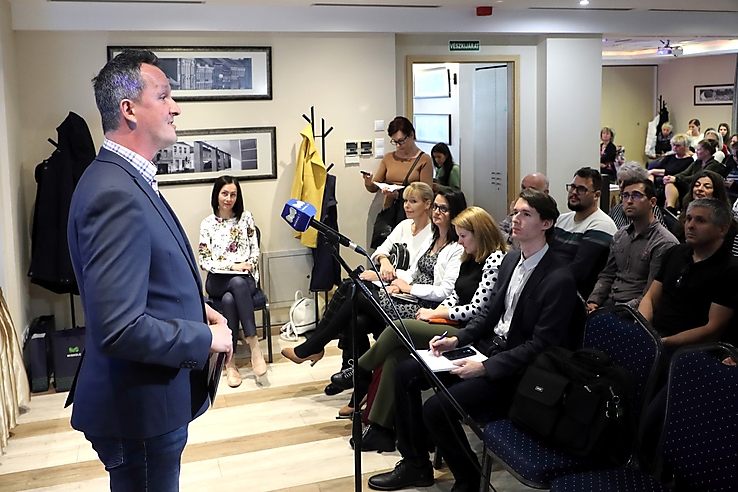
Accordingly, the more than 100 participants of the conference first listened to three presentations. Gábor Osgyáni, the professional coordinator of the 4IM project spoke about the program's innovative tools. After that, Péter Molnár, the general director of the Miskolc Vocational Training Center, presented the innovative educational methods of the institute, and finally Ferenc Dávid, the head of the Kékpont Foundation's Innovation Working Group, spoke about the experiences of the "House of Sobriety" program.
After the lunch break, the program continued with interactive sessions, during which those interested could learn about the practical aspects of the innovations presented in the lectures.
The article was based on the minap.hu article.
June 2023
YOU HAVE BECOME ROLE MODELS IN RECENT MONTHS
" Students from the Tetemvár project area concluded the first year of the 4IM mentoring action plan with video projects, and together with students from Bábonyiérc they also took part in a forest school excursion. As the school year draws to a close, students from the 4IM project area in Tetemvár presented their videos as a closing of the first year of the project's mentoring programme. The third and fifth grade students of the Petőfi Sándor Elementary School in Miskolc and the 9th grade students of the Lévay József Reformed High School in Miskolc have forged a real creative community over the past months. Ildikó Elek, the third-grade class teacher, called her students' work a real community experience and, seeing their success, encouraged them to create more projects in the coming school year. "You have become role models in the past few days" - these were the words used to sum up the fifth-graders' video project by Péter Püspöki, their class teacher. The students of the Petőfi prepared not only film works, but also drawings, a Petőfi quiz and a drawing exhibition, which was held in the school's gym where they welcomed the guests, including the mentors of the Lévay High School. Within the framework of the 4IM project mentoring action plan, the 9th grade students of the Lévay József Reformed High School in Miskolc started a cooperation with the 3rd and 5th grade students of the Petőfi Sándor Primary School living in Tetemvár. The students of the Fényi Gyula Jesuit High School and College in Miskolc support the Bábonyibérc students of the Bársony János Primary School. Students from Tetemvár and Bábonyiérc also took part in two forest school programmes in June. In the first week of June, they competed in an educational quiz at the Csanyiki Forest School of the local forestry company Északerdő Zrt. At the end of the month, they participated in a guided discussion with representatives and staff of the Miskolc municipality and the 4IM project at the Bagolyvár Forestry Forest School of Északerdő Zrt. in Varbó- Fónagyság. The staff of Északerdő held sessions on the theoretical and practical importance of eco-sustainability and its application, and the students also visited a hunting dog demonstration.
Mainstreaming integration

Offenbach, in the conurbation of Frankfurt-am-Main in the middle of Germany, is the most diverse town in the country. Hungarian and Slovak partners in the 4IM project visited in June to learn some lessons in successful integration.
The programme of the 2-day study visit included presentations on Germany’s employment and social security system, a walking tour of the nearby Nordend district, and a visit to the office of Caritas, one of the town council’s key partners
Organised by AEIDL, the visit enabled actors working on integrating the most vulnerable groups in different countries to reflect on how good practices developed in other European cities could be tailored to the context in Miskolc and Košice.

On two scorching days in June 2023, a group of visitors from Miskolc (Hungary) and Košice (Slovakia) made their way to Offenbach, in Germany’s Frankfurt conurbation. They were received by Matthias Schultze-Böing, leader of the EaSI-funded CRIS project and eminence grise of the MainArbeit municipal job centre.
High diversity
Offenbach, with a population of 140,000 (about the same size as Miskolc), is notable for being the municipality with the highest share of migrants in its population in Germany – 32% of its residents are foreign-born and as many as 70% have a migration background. Historically the centre of Germany’s leather industry, a major source of employment today is in transport and logistics. Frankfurt Airport, which employs 88,000 people, is 20 km away, and the docks on the river Main are also major employers.

Many people see Offenbach as offering a model of how to successfully integrate a migrant workforce. A key factor in this is that its population comes from many countries. Turks make up the largest community, but the town is home to over 150 nationalities, with four communities – Turkish, Romanian, Bulgarian and Greek – numbering over 5,000, and a further three – Croatia, Italy and Poland – numbering over 4,000. This diversity leads to one simple fact – you can’t get by in your native language and you have to learn German. With this competence under your belt, job mobility is opened up.
Of course integration in society depends not solely on having a job, but also on having and income and access to social services – the three pillars of the EU’s Active Inclusion Strategy. Since the days of Bismarck, Germany’s social security system has consisted of two pillars: an insurance-based system for those in regular paid work, and a welfare system for the others. In 2005, this division was overcome through the ‘Hartz IV’ reforms. The two systems still exist, but they now work hand in hand. Sozialgesetzbuch II (SGB II) deals with unemployment insurance, while SGB III deals with welfare transfers. This unified system guarantees a minimum disposable income of €503 per month, whether you are working or not. Nationally, around 55% of recipients have a migration background.
Integration is mainstreamed
This integrated approach is carried through at municipal level. There is no separate integration policy – it is everybody’s business. Departments work together according to a complicated matrix of interrelationships, with the four main pillars being employment, education, urban development and social cohesion. For instance:
- the employment department deals with jobs, skills, entrepreneurship and the school-work transition;
- the education department caries out social work in schools and offers early years language learning;
- the urban development department builds mixed areas which avoid segregation;
- the social cohesion department supervises neighbourhood management and migrant involvement in civil society.
It is, in Matthias Schulze-Böing’s words, “a never-ending story of co-ordination”.
The approach to the clients is integrated too: to help them get off benefits, counsellors work intensively with whole families to explain procedures, help fill in forms, solve problems, and accompany people to job interviews. The basic rules are to treat the family as a system, accept its members’ cultural preferences, and build trust. It is notable that the whole is co-ordinated by MainArbeit – the Job Centre – rather than the social services department, and it has built an integrated database to combine employment, social and benefits information. Selected clients benefit from a proactive job placement service.
Neighbourhood offices

The tour of Nordend started at the Stadtteilbüro (neighbourhood office) on Goetheplatz, where, perched on a table in its multi-functional shopfront premises opposite a primary school, co-ordinator Marcus Schenk explained how it works. The Stadtteilbüro offers a model for the access points (elérési pontok) to be set up in the two neighbourhood of Bábonyibérc and Tetemvár in Miskolc.
Since 2005 the municipality of Offenbach has established five of these offices. Each of them serves a population of around 10,000, a factor of magnitude larger than the two Miskolc neighbourhoods. To escape any bureaucratic approach, they are operated under contract by local organisations, although these are private contractors, not community associations. They are full of life, the focus for many community activities: after-school clubs, book exchanges, amateur dramatics, gaming, community gardens hewn from the roadspace. Progress in removing cars from the landscape is slow.
Nordend benefits from being a mixed neighbourhood, in which midrise housing is interspersed with industrial premises such as the Heyne Fabrik, an old screw factory now listed and gentrified, which houses, among other companies, the German headquarters of jeans manufacturer Levi Strauss. The neighbourhood is densely built-up but has a “lung” in the form of the docks off the river Main, which flows along its northern edge. Here, among the newly-built blocks of flats and the preserved dockside crane, there is space for community gardens as well as lazing in the sun.
Diversity brings resilience

The visit to the Offenbach branch of Caritas revealed the irony that a tight labour market can imperil community initiatives. The work integration social enterprise (WISE) CariJob relies on public subsidy to provide 19 jobs for people “far from the labour market”, who are employed to collect old furniture and sell it at reasonable prices. The subsidy covers not only wages but the cost of a core of professional managers. The problem is that nowadays CariJob cannot find enough needy workers. Currently only about 60% of its places are filled. This has effectively halved its income, and its survival is imperilled. One solution may be to diversify sources of income, for instance by convincing the waste collection department to contribute to its running costs. There may also be scope to step up the repair and renovation of furniture, which would introduce skills training into the equation. Here again, diversity brings resilience.
Institutions matter
As the visitors discussed what they had learnt, the point that stuck the visitors most forcefully was the strong tradition of welfare associations in Germany, and the high level of trust that enables effective partnership and networking. The trust on which the town’s network strategy depends has been built up over decades and centuries. In comparison, Hungary lacks that institutional depth.
The varied menu laid on by MainArbeit offered rich learning for the Hungarian and Slovak visitors. If the model of the Stadtteilbüro is not directly transferrable because of the scale it requires, the way the municipality addresses integration as a cross-cutting priority, and its keenness on internal and external collaboration, are valuable lessons.
Further reading
MainArbeit: https://www.mainarbeit-offenbach.de/
“Arrival City” Offenbach am Main. Challenges for Urban Development and Integration Policies, Matthias Schulze-Böing: https://www.schulzeboeing.de/fileadmin/user_upload/PDF/Downloads/Migration-Integration/Arrival_City_Offenbach.pdf
Toby Johnson, AEIDL
March 2023
The Bábonyiérc community of the 4IM project took an active part in spring cleaning The 4IM Bábonyiérc project area's spring litter collection, linked to a change of attitude towards the environment, was a complete success. The members of the Bábonyibérci Self-help Community (BÖK) collected waste selectively to fill all the garbage bags provided by the Miskolc Regional Waste Management (MIREHU) Ltd. It was the BÖK's umpteenth successful community-building action under the 4IM project. The BÖK, formed through the implementation of the 4IM project, joined the city's day of action on 18 March to clean up the Szinva stream that runs through Miskolc. At the call of the BÖK, several families from Bábonyiérc took part in the litter picking, collecting rubbish for several hours on the hillside surrounding the stream. The community members cleaned up the waste at the 6.8-kilometre-long Bábonyibérc section of the Pece stream, which is a branch of the Szinva stream. The Pece stream now has a low flow rate, but it used to run mills, and its destructive power was evident during the great flood of 1878 in Miskolc, which caused the greatest loss of life in Hungary in the 19th century. Prior to the waste collection, Gábor Simon, the transport manager of MIREHU, gave an awareness-raising presentation at the community center of the BÖK, drawing attention to the importance and usefulness of selective waste collection. The lessons learned were applied to the collection of different types of waste by members of the Bábonyiérc community. The March Community litter pick ended with a convivial pizza lunch. Without social cohesion, without setting an example, communities living under different circumstances but forming a group as city dwellers will fall apart, which is why the active stand of the Bábonyibérc people in support of conscious, considerate and careful use of the environment was so important. As a result of community cooperation, the relationship with the people living in the neighboring areas of Bábonyibérc and the surrounding streets will also improve, facilitating cooperation, which is one of the main objectives of the 4IM project. Multi-stakeholder cooperation is key to successfully addressing complex societal challenges such as the integration of vulnerable groups. It was the BÖK's umpteenth successful community-building action. Last year, they repaired stairs, picked up rubbish, cleaned ditches, planted flowers in the public square, and by renovating the interior and exterior of it, they created the first community center in Bábonyiérc. The fence and the area around the building were cleared of weeds in the summer, and in September waste was collected from the public areas around the community centre. The community volunteered to take on this task because they felt it was important for the group to function and remain active. In effect, they have created a community center in a neighborhood where there was no cultural, meeting or community point. 4IM is piloting an innovative model in Miskolc to make services more accessible to people in vulnerable circumstances and empower them to become agents of change. The environmentally conscious community litter picking is an integral part of the 4IM project's efforts to strengthen self-help activities that activate social groups, encouraging citizens in Tetemvár and Bábonyiérc to take action. The innovative integrated package of services being developed in the 4IM project will result in changes to the city's social and employment services to better and more effectively meet the needs of disadvantaged neighborhoods.
Also the Social Action Plan is helping 4IM project participants Thanks to the project's Social Action Plan, good quality consumer goods and clothing have become available to people living in the 4IM project area. On 20 March, a rich consignment from the Netherlands arrived in Miskolc, arranged by the managing organisation of the project, the Miskolc Municipality's Resource Centre. The 24-tonne truck’s loading area was filled completely with a variety of goods, due to the quantity and diversity of which it took several hours to unload. Members of the action groups in the two target areas of the 4IM project, as well as people living in Bábonyiérc and Tetemvár, who had been informed in advance of the opportunity, could choose from a selection of items of interest to them. After sorting, evaluation and needs assessment, the Resource Centre staff will also distribute the consignment to people in the project areas who were unable to be present when the consignment arrived. Of the six action plans it has developed, the Centre launched the Social Action Plan at the end of last year. Brand new and unused shoes were handed over to people living in the deprived neighbourhood at the Bábonyiérc community centre before Christmas. The building, which was provided by the municipality, was renovated inside and outside by the members of the Bábonyibérc Self-Help Community, a local action group, in the autumn - thus creating the first community centre in Bábonyibérc. At the beginning of March, in the run-up to International Women's Day, the staff of the Bábonyibérci Self-Help Community (BÖK) distributed more than half a million forints worth of new women's shoes in different sizes and styles. In January, a charity clothing distribution was held at the BÖK community centre as part of the 4IM project. 4IM project activists cleaned up the stream bank The spring litter picking in the Bábonyiérc project area, linked to a change of attitude towards the environment, was a complete success. The members of the Bábonyibérci Self-help Community (BÖK) collected waste selectively to fill all the garbage bags provided by the Miskolc Regional Waste Management (MIREHU) Ltd. The BÖK, formed through the implementation of the 4IM project, joined the city's day of action on 18 March to clean up the Szinva stream that runs through Miskolc. The community members cleaned up the waste at the 6.8-kilometre-long Bábonyibérc section of the Pece stream, which is a branch of the Szinva stream. The Pece stream now has a low flow rate, but it used to run mills, and its destructive power was evident during the great flood of 1878 in Miskolc, which caused the greatest loss of life in Hungary in the 19th century. Prior to the waste collection, Gábor Simon, the transport manager of MIREHU, gave an awareness-raising presentation at the community centre of the BÖK, drawing attention to the importance and usefulness of selective waste collection. The lessons learned were already being applied during the collection by young and old alike. The BÖK and the staff of the Resource Centre, which manages the 4IM project, were joined by young members of the Church of Jesus Christ of Latter-day Saints, and Sándor Erdei, the local councillor of the area. It was the BÖK's umpteenth successful community-building action. Last year, they repaired stairs, picked up rubbish, cleaned ditches, planted flowers in the public square, and by renovating the interior and exterior of it, they created the first community centre in Bábonyiérc. The fence and the area around the building were cleared of weeds in the summer, and in September waste was collected from the public areas around the community centre. The community volunteered to take on this task because they felt it was important for the group to function and remain active. In effect, they have created a community centre in a neighborhood where there was no cultural, meeting or community point. The March community litter picking ended with a fun pizza lunch, the children also received small gifts as a reward for their hard work.
Action plans of the 4IM project are being launched one after the other Balloon games, gardening, pizza lunch at school A milestone in the progress of the 4IM project is the launch of a series of action plans incorporated into six packages for people living in the two project areas, organised by Resource Centre, the Miskolc Municipal Organisation, which is responsible for the operational management of the project. The packages contain proposals for grassroots initiatives, formulated by the local action groups in Bábonyiérc and Tetemvár and supported by the Resource Centre. The project will implement the following initiatives: Action plan for employment and labour market, Mentoring Action Plan, Waste management Action Plan, Housing Action Plan, Action Plan for community actions and events, Social Support Action Plan. The Resource Centre and its consortium partner Abaújrakezdés started organising the mentoring programme last autumn, over several months, to make it a success. Within the framework of the mentoring action plan, the 9th grade students of the Lévay József Reformed High School in Miskolc started a cooperation with the 3rd and 5th grade students of the Petőfi Sándor Primary School in the Tetemvár district of the 4IM project. The students of the Fényi Gyula Jesuit High School and College in Miskolc support the students of the Bársony János Primary School in Bábonyibérc. First, at the Jesuit High School, the students got to know each other and the huge institution, and had lunch together. Afterwards, the primary school students hosted the students of the high school, with whom they set up raised beds in the garden of the institution, but the programme also included the joy of playing together. Students can also apply their newly acquired horticultural knowledge at their homes by installing raised beds and transplanting garden plants into the above-ground equipment. The soil is held together by a frame made of different materials, most often wood, but also brick, concrete, stone, metal or straw bales. At the beginning of March, the students of Lévay visited the Petőfi Sándor Primary School, where they were warmly welcomed by head of school Éva Simon, as well as teachers and students. Péter Szabó, the prevention expert of Abaújrakezdés, held an informal "class teacher lesson” on the life, plans and experiences of the school, which was marked by a five by all the students. The pupils of the Lévay school were welcomed with a stage show by the students of Petőfi, with whom they then formed groups and competed in the games of evolution, ballooning and building the tall castle of Déva. The community programme, which was always in a good mood and brought students closer together, ended with a cheerful and noisy pizza party.
What is behind the scenes of the theatre? 4IM project mentored students on exploration Students participating in the mentoring programme of the 4IM Project have discovered secrets of the Miskolc National Theatre that are not visible from the audience. On 29 March, the mentoring students of the Lévay József Reformed Secondary School together with the 3rd-5th grade students of the Petőfi Sándor Primary School in Miskolc had a chance to take a look behind the scenes of the bicentenary Miskolc National Theatre. Noémi Méder, the institution's press relations officer, gave the students a tour to the part of the theatre unseeable from the auditorium. The visit took place as part of the 4IM project, as part of the mentoring action plan developed by the Source Centre, the project management operational organisation of the Municipality of Miskolc. In the course of this, the students of the high school will take part in educational, developmental and playful activities together with students from the two project areas, forming a friendly relationship. During the visit, the young visitors were introduced to the secrets of making snow and rain on stage, the secrets of lighting, set and stage movement, the orchestra pit, the set storage, and all the play areas inside and out. As the visit became more relaxed, the students asked more and more questions to the theatre's tour guide, who also told them, for example, what animals were on stage. The response surprised both the pupils and the accompanying teachers, who learned that even a real horse was given a role on stage. The students enjoyed the magical atmosphere of the stage so much that some of them even showed off their dancing skills. The mentoring action plan of the 4IM project also involves students from the Gyula Fényi Jesuit High School and College in Miskolc, who are mentoring students from the János Bársonyi Primary School in the Bábonyiérc project area.
December 2022
FULL HOUSE SANTA CLAUS PARTY IN BÁBONYIBÉRC
The Santa Claus of the 4IM project visited 30 families in Bábonyiérc The Bábonyibérc Voluntary Community (BÖK) is back in action! A community event was organised for the children of the neighbourhood as the Christmas holidays approached. The aim of the event was to strengthen neighbourly relations in the area, reduce the feeling of exclusion and increase the willingness to cooperate. To achieve this, donations were collected, volunteers were sought, partnerships were built, and the community centre was prepared to welcome the celebrants. During the event, children had the opportunity to make handicrafts to prepare for the festival of love. After the event, the BÖK Santa Claus personally visited the families with children in the neighbourhood, making Christmas brighter for 30 families. On 5 December, a cheerful, intimate Santa Claus party was held at the project's access point community centre, which was renovated, painted and tidied up by the Action Group members during the autumn. From 4pm the children were arraving, they completely filled the large room of the community centre, which was dressed up in Christmas finery. Students of sociology, social work and cultural anthropology from the University of Debrecen and the University of Miskolc held a Christmas craft workshop. The children participated in everything, the most popular face painting was the Spiderman for the boys and the butterfly for the girls. The glitter tattoos in the shape of the traditional Christmas candy were also a popular choice, the tables were loaded with Christmas star-shaped candles being prepared. After half past four, the moment came when the room could no longer occupy any more celebrants. The session ended with the consumption of refreshments and sweets, and then the Santa Claus of the 4iM project, with his bag loaded, went to visit the families of Bábonyibérc, he was accompanied by his elf - whose rattle did not scare anyone - and visited thirty families with his gifts.
November 2022
THE AIM IS TO DEVELOP LONG-TERM SOLUTIONS
The quarterly consortium meeting of the 4IM project took place in Miskolc on 22 November. Andrea Varga, Deputy Mayor of Miskolc, responsible for human matters, welcomed the participants, stressing that the project contains a number of positive development opportunities, which can be applied in a systematic way. To find the best methods, one needs to keep answering the following questions. How to think ahead? Which solution works best? What needs to be changed? Finding the answers requires the consortium partners to work together and pool their experience. Representing Abaújrakezdés, Balázs Dernei emphasized the importance of mapping the partnership circle, the development of outreach points, the importance of action groups and community programmes set up with the help of community coaches. In the coming year, the two new staff members working in the field will provide tangible support in the use and application of the service packages. On behalf of AEIDL (European Association for Innovation in Local Development), Patricia Martinez listed the achievements of the past months and their work. The organisation is responsible for compiling a knowledge base, producing video interviews, films, sharing their experiences on social inclusion, community support, increasing the effectiveness of communication work, and providing international information on the project. Annamária Nagy-Kórodi, project manager of HÁRFA Foundation, reported that they contribute to the organisation of workshops, capacity building, the completion of development-communication, the work of the communication working group, the development of the partner map, the evaluation of the project, the preparation of dissemination materials, the organisation of meetings, and project management. Kinga Szabó-Tóth, Head of the Institute of Applied Social Sciences of the University of Miskolc, presented the main experiences of the analysis of the household surveys conducted in the two project areas, Bábonyibérc and Tetemvár during the summer, and drew attention to the fact that the summary of the results will be made available to the consortium members. Norbert Képes, Head of the Resource Centre, emphasised the importance of building partnerships in his report, as only through these can long-term solutions be developed. It was important to learn about the everyday lives of local people and the obstacles they face, as these matters were highlighted during community discussions. As he underlined, Community Action Groups should become the driving force for project implementation, and they will continue to broaden the range of partnerships that can be involved in project implementation. The primary objective is to improve the opportunities for people living in the project area through the use of service packages, by building a self-help community of project participants with their own goals. The model, developed in a complex way, will be a model to promote the catching-up of deprived neighbourhoods, he added. Viktória Holdiné Varga, the financial manager of the Municipality of Miskolc said that financial deliveries are made on time as the project progresses. The funds are used to the extent and within the limits provided. MAYOR OF MISKOLC: WE PUT SPECIAL FOCUS ON THE SUCCESS OF THE 4IM PROJECT Mayor of Miskolc Pál Veres received the leaders of the 4IM Bábonyibérc project groups on 16 November at the Town Hall. Pál Veres said that he is paying special attention to the development of the project, which is why he has initiated a personal meeting. The leaders of the Bábonyiérc and Tetemvár groups briefly described the difficulties of organising and activating the community, the results achieved and the goals that the municipality can help to achieve. The people of Bábonyiérc spoke of their renovation of the municipal building as a clear success, which now serves as the Bábonyiérc community centre, welcoming people in the project area for various programmes. A weed-cleared garden attached to the house will be used to create a vegetable garden and composting plots. The mayor assured the participants of his support, and in the spring he will carry out site visits in Tetemvár and Bábonyibérc to see the impact of the project's achievements. COMMUNITY WORK MAKES WONDERS TO COMPLETE A COMMUNITY HOUSE The 4IM project's Bábonyiérc action team renovated a building to create a new home for the community, clearing the garden of weeds and the surrounding public spaces of litter. From November on, the 4IM project's Bábonyiérc Action Group may continue its community organising work in a renovated building. The community's "new home" was created thanks to the work of a group of self-starters. During the first days of November, the members of the action group painted the inside and the outside of the house provided by the municipality as an access point to the project area. The building has also had its doors and windows renewed, benches and tables installed in the room, and the entrance has been fitted with solar lights - all of which have made it fully fit for community events. The value of home building is not just the renovated building, but the grassroots, self-organising initiative itself. The municipality is not in a position to provide financial support, and there are no funds for investment in the project. The community volunteered to take on this task because they felt it was important for the group to function and remain active. In effect, they have created a community centre in a part of the city where there was no cultural, meeting or community point. Thanks to the 4IM project, the local population's need for the creation and operation of a community space was raised, which was voluntarily undertaken and implemented by the Bábonyibérc Self-Help Community. The action group has already organised several community projects this year: they have repaired stairs, picked up rubbish, cleaned ditches and planted flowers in public spaces. The fence and the area around the building were cleared of weeds in the summer, and in September waste was collected from the public areas around the community centre. The renovation of the house was their biggest undertaking to date, the renovated building will provide a long-term space for the 4IM project's community events.
Október 2022
SERVICES TO HELP FAMILIES PARTICIPATING IN THE 4IM PROJECT
In reaching another milestone, the 4IM Project's Social Innovation Standing Group (TIÁM) has demonstrated that by thinking outside the box, by working together, innovative services can be delivered that create opportunities for progress for those who are ready to seize them. The Social Innovation Standing Group held a workshop in Miskolc on 10 October to further refine and develop integrated service packages. The packages contain proposals for grassroots initiatives, formulated by the local action groups in Bábonyiérc and Tetemvár and supported by the Resource Centre. These proposals will be further developed and filled with content by the TIÁM. The action plans, broken down into service packages, are as follows: • Action plan for employment, labour market • Mentoring Action Plan • Waste management Action Plan • Housing Action Plan • Action Plan for Community actions and events • Social Support Action Plan As per the plans, out of the six service packages, the waste management plan, the mentoring and the employment package would be implemented in the near future. Gábor Simon representing Miskolc Waste Management Company MIREHU said that anyone with a waste management contract can request house clearance in two project areas, Bábonyibérc and Tetemvár. They will help residents to start sorting their waste, and he outlined the "More bins" programme: 10-10 families will be selected to join. As part of the housing package, the development of a community framework and the learning and use of composting techniques in the yards as part of the promotion of environmental awareness were also considered. In the framework of the mentoring programme, it was discussed that the Ámbédkar School will involve students from grades 7-8 from Bábonyibérc and Tetemvár in the project. The school is also dealing with the 16-25 year olds, giving them a second chance: they will be offered a dormitory, a full-time vocational training and evening classes. Participants said it was a useful idea to have board game sessions in the field, with high school or university students. The idea of involving high school classes and students to deliver mentoring was raised, for that the support of the heads of the institutions should be sought. Sensitisation will play an important role in convincing them, in that the Episztémé Association, the University of Miskolc "KÖSZI" Office and the Dialogue Association will also play their part. The employment package will be implemented in cooperation with the Miskolc Paktum Office and Kézfogás Kalaszter, EAST Job Kft., and Agromag Kft. Questionnaires and in-depth interviews are to be used to help participants find their way around the labour market, so that they receive the best support for their needs. This scheme will make it easier for them to find, start and keep their jobs. The importance of supporting children to attend institutions, reducing their trauma and providing information on substance abuse was also mentioned, with the Laurusz Foundation offering advice to prospective mentors. The Social Innovation Standing Group will organise a new partners' meeting in January 2023 to assess the results of the past quarter and to continue working on the rest of the innovation package.
September 2022
FOCUS ON THE MULTI-DIRECTIONAL DEVELOPMENT OF COMMUNITIES
The 4IM Project's Standing Working Group on Social Innovation reviewed the tasks completed and to be completed at a project evaluation meeting in Miskolc, supplemented by a workshop. The Municipality of Miskolc launched the "4IM" project in the spring, funded by the European Union, under the name of "City Initiative for Innovative and Integrated Social Services and the Development of Employment". The Social Innovation Standing Group, which oversees the progress of the initiative and was set up in May by the local partners involved in the project, reviewed the lessons learned over the past months on 6 September in Miskolc. First of all, Dr. Mátyás Domschitz presented on the effectiveness of star-shaped communication at his workshop on organisational development and cooperation. He gave the example of attending a meeting to answer questions such as: "Should I go and talk to the person I know the least? What am I good at? How could we cooperate, what can we do together? How can the problems be solved?" The working group meeting was followed by a session where project partners shared their experiences and ideas. Attila Krabák, representative of the Észak-Kelet Átjáró (North-Eastern Gateway) Association, drew attention to the community-building benefits of "kama", a children's ball game popular in Miskolc for generations. Robin Salter, Head of Communications at AEIDL, also highlighted football as a game of social organisation, with a core value of openness, welcoming and integrating anyone who wants to play. An additional advantage is that these football gatherings can be promoted on social platforms, all the while keeping sensitisation in mind. Tamás Wágner, the community coach of the Bábonyibérc project area, indicated that they try to bring in as much ideas from outside as possible, including the joint football experience. It was also mentioned that the project implementation should address the issues of the registration of the dwellings of the people living in the project area, their physical improvement and the fight against the accumulation of litter. In the latter case, the awareness-raising activities of the Miskolc waste management company and its app could be useful - but to solve both problems, a coordinator will be needed. József Kotics, representing the Episztémé Association, stressed the importance of sensitisation through training and recruitment of partners. He considers the creation of identity, which represents the values of belonging, to be a key issue, as it can have a very positive effect, while, in his view, religion can have less of an impact in this respect. He is convinced that small steps need to be taken to involve people. According to the local Roma municipality, leading by example can be a big help, and families who can inspire the people living in the project area should be embraced. All this while keeping constant contact with schools. Robin Salter gave an inspiring presentation on local development communication: from the example of traffic lights, starting with one-way communication, through two-way communication, to understanding cognitive processes. He presented the encoding - decoding of messages through a situation in which inevitably many different interpretations arise due to the differences of the decoders, the external audience. He also spoke about internal communication, where clear, agreed messages, objectives and coherence are desirable, with the coherent teamwork that goes with them. He advised to map and group the target groups of communication, the existing opinions, ideas, project messages, objectives, communication methods, and partners to work with. Positive keywords in development communication can be: "together, community, hope, better, inclusion, development, harmony, solidarity, happiness..." Inclusive participation will motivate the partners, he added, because if we empower our target group to communicate, we ourselves will become more effective. He also referred to the role of dialogue as a key element, as well as the formulation of problems and solutions, and the importance of allowing targeted groups to develop their own communication paths. Toby Johnson, economic development advisor for community enterprises, gave a presentation on successful social enterprises across Europe. He spoke about principles, legal forms, number of organisations, and economic weight in the EU. These joint ventures can combine several resources, multiplying the impact of the resources mobilised. He mentioned three main types of social enterprises that make up this fast-growing sector: workplace inclusion, social services and ethical trade. The sector is also growing in Hungary, although at a much more modest rate than in Europe. A total of 16 thousand such businesses were registered in 2014, with 73 thousand employees and a turnover of HUF 2.3 billion. Márczis Márta Márta, the project manager, in her methodological presentation, discussed the experimental nature of the project, whose parts, framework tasks and operational areas are also taking shape as it goes along. An own project innovation is the creation of the Resource Centre, the involvement of community coaches, the creation of community action groups, the building of a network of partners, which involves a lot of effort. The 4IM project's core value is to follow the policy and practice of its funder, the European Union, which promotes integrated development. She pointed out that in the implementation they are trying to make the structure as simple and transparent as possible, because it makes the project stronger. She quoted Indira Gandhi: "Be the change you seek!" Dr. habil. Kinga Szabó-Tóth, Head of the Institute of Applied Social Sciences at the University of Miskolc, shared the background and data of their surveys of several hundred households in the two project areas, Bábonyibérc and Tetemvár, conducted in the summer with the members of the working group. Read her full report below. The basic objective of the 4IM project is to help people in the most vulnerable situations through various interventions at local and municipal level, by building a network of supporting partners. During its implementation, it will introduce a new pilot social model and develop a new institutional structure that will allow the various public, private and civil partners involved in the project to work together effectively. A further aim is to review sectoral policies and the effectiveness of the various municipal subsidies.
THE 4IM PROJECT HAS ENTERED A NEW PHASE 4IM PROJECT CONSORTIUM MEMBERS SHARED THEIR EXPERIENCES FROM THE PAST MONTHS AT A MEETING IN MISKOLC . On 7 September 2022, the members of the 4IM project consortium summarised their experience in the implementation of the project. Mónika Szakács, Project Manager of the Municipality of Miskolc, highlighted the positive results achieved in communication. Norbert Képes, head of the Resource Centre, said that the priority was to identify services for project participants and to provide various training courses. The Abaújrakezdés Public Benefit Association reported that a new colleague is helping the community action groups. Annamária Nagy-Korodi, Project Manager of the HÁRFA Foundation, highlighted among others the organisation of capacity building workshops and staff training, the national dissemination activities, the operation of the communication working group and the creation of the visual elements of the project. Márta Márczis, the project's technical manager, presented the changes in the design of the contact points and announced the good news that a service liaison colleague will join the field team. Andrea Klára Varga, Deputy Mayor of the Miskolc Municipality responsible for human affairs, called the background work carried out by the Resource Centre and the activities of the community coaches extraordinary. She added that the municipality is planning public space improvements in both project areas. In Bábonyibérc, they want to create a community space, and in Tetemvár they intend to contribute to the successful implementation of the project by installing sports equipment.
Community survival or destruction?
Community development in the slums of Miskolc, Hungary
AEIDL is the EU-level partner in the 4IM project, which is developing an integrated way of delivering welfare services to slum areas in the Hungarian town of Miskolc. Its conference in September examined what life in these segregated areas is like, and how to improve it.
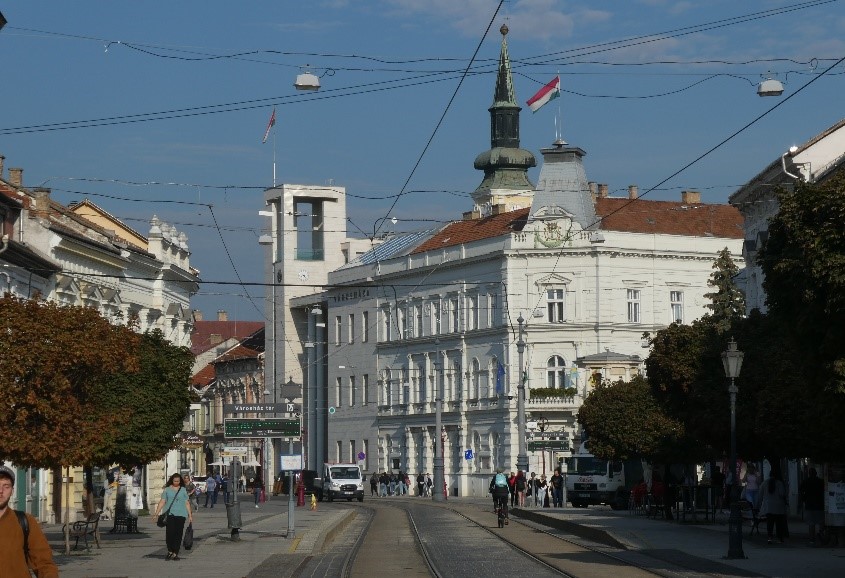
|
Miskolc town hall |
 Miskolc is a town of 160,000 in the north-east corner of Hungary, 60 km from the border with Slovakia. A trade centre since mediaeval times, the town grew into a coalmining and steelmaking centre in the 19th century, but this industry has now largely closed down. Its long, handsome, car-free main street, off which branch numerous side streets and alleyways, has largely been renovated, but is today eerily quiet: much of the commerce has emptied out into shopping centres and peripheral supermarkets owned by global brands.
Miskolc is a town of 160,000 in the north-east corner of Hungary, 60 km from the border with Slovakia. A trade centre since mediaeval times, the town grew into a coalmining and steelmaking centre in the 19th century, but this industry has now largely closed down. Its long, handsome, car-free main street, off which branch numerous side streets and alleyways, has largely been renovated, but is today eerily quiet: much of the commerce has emptied out into shopping centres and peripheral supermarkets owned by global brands.
Blighted neighbourhoods
The town is home to a sizeable minority population of 7000 Roma, most of whom live in one or other of 16 slums – densely-populated disadvantaged areas somewhat misleadingly called ‘segregated’ – dotted among the more general mid-rise blocks of flats. These present a very different picture from the town centre: the roads are unpaved, and the single-storey houses, end-on to the road, lack running water – which residents fetch from shared blue standpipes – or mains sewerage. Their populations are quite mixed – some Roma, some not – but share the fact of poverty. In the face of it this is odd because many have jobs – but these tend to be ‘off the books’, often as building labourers or cooks. Many residents are not even officially living there, but are still registered in their family’s home villages. They thus do not qualify for official help.
The population is in steady decline. Those who can find an opportunity elsewhere emigrate, and as they cannot sell their houses, simply leave them empty. They are immediately pillaged by their erstwhile neighbours. Other residents eke a living by collecting rubbish, sorting through it for saleable items – and then dumping it wherever they can. The municipal council does not collect this rubbish, and so rats proliferate in the unsightly empty plots.
The result is a marginal world where everything is decline: population, sense of community, living standards, health. The only thing that is rising is the average age of the inhabitants. In the past, the right-wing local government's solution was to force residents to move out of some of these neighbourhoods and demolish the buildings. Meanwhile, no improvements are made. However Miskolc town council, opposition-controlled since 2019, believes in integration and avowedly aims to make the town “a place for everyone”. It has gone into partnership with the city of Košice (85 km away in Slovakia, but with a large Hungarian-speaking population), the university and two NGOs to integrate the city. The European partner in the project is AEIDL, which works mainly on sharing the results throughout Europe.
A new welfare system
 The 4IM project (Initiative for Innovative Integrated Interventions in Miskolc) has won some €850,000 in finance from EaSI to pilot an integrated welfare system in two of the town’s slum districts, Bábonyibérc and Tetemvár.
The 4IM project (Initiative for Innovative Integrated Interventions in Miskolc) has won some €850,000 in finance from EaSI to pilot an integrated welfare system in two of the town’s slum districts, Bábonyibérc and Tetemvár.
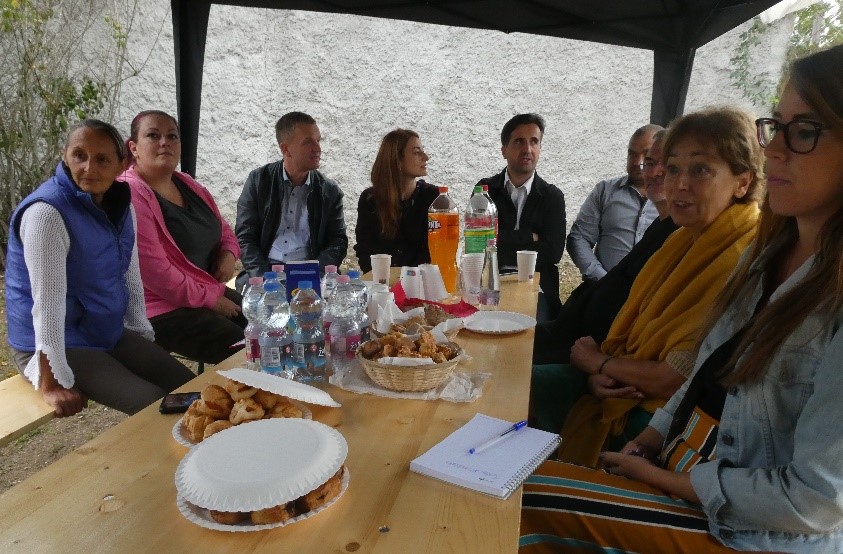
|
Meeting of the Bábonyibérc community action group |
4IM builds on previous groundwork, in which local associations such as Abaújrakezdés have nurtured the first initiative to create Community Action Groups (CAGs) in the two communities. From the beginning of the 4IM project, these small active groups have been extended and strengthened with the help of the Social Innovation Resource Centre. This is a newly established managing body to coordinate the project activities and, as it is planned, to coordinate city-level integrated interventions for social inclusion in the long term. The Resource Centre has organised a number of self-help activities which have cleared rubbish and repaired road and wells. This work is now to be complemented with the development of an integrated approach to delivering welfare services within the municipal authority. The project is guided by the town’s Social Innovation Standing Working Group, and two Neighbourhood Coordinators are soon to start work as the residents’ access points to the city’s social and employment services. The project aims to bring at least 300 local residents into or at least closer to the labour market.
Community coaches play a key role. One line of attack is to keep more of the residents’ money circulating within the neighbourhoods. Tetemvár already supports a local shop, so the Bábonyibérc CAG is gestating the idea of opening one of their own. Both communities, Tetemvár and Bábonyibérc, dream of establishing community centres, possibly in containers. The main stumbling block at the moment is how to afford a connection to the electricity grid. Another idea is to capitalise on residents’ building and cooking skills.
How slums arise
In September 2022, the 4IM project held a conference in Miskolc town hall to take stock and plan its continuing activities. Under the guidance of facilitator Mátyás Domschitz and AEIDL’s communications trainer Robin Salter, members of the town’s Social Innovation Standing Working Group and the project workers learnt about the drivers of exclusion, thought about what inclusion means, mapped the population groups and their interrelationships, carried out role plays, formulated communication campaigns, and resolved bottlenecks in progress. Among the most interesting contributions was that from Kinga Szabó-Tóth from Miskolc University, who described the background to the bad conditions in the town’s segregated areas.
Slums don’t happen by themselves, she said. People move into town from rural areas, and use the segregated areas as stepping stones before they move elsewhere. So you can’t just abolish them at the stroke of a pen – if you were to demolish them, the same conditions would arise elsewhere. People are in transition. They live there in the present, and don’t plan for the future. Things are tolerable for the time being. Hence there is little sense of community and little communal activity. Some residents, particularly widows, have few friends and live isolated lives. But most people have someone they can turn to for help and could borrow €50 from in an emergency. The top spending priority is mobile phones.
 A survey carried out over the summer looked into residents’ motivation, bonding, mental health, skills and resources. It discovered that “weak links” or bridging social capital – connections with people from different walks of life – are very important, and play a particularly important role for children. A surprising finding is that the populations of the two pilot areas are highly differentiated: there are middle-class people who like living close to the city centre, and people working abroad. Although many of the houses are dilapidated, many residents prefer their homeliness to living in a block of flats. And there is a lot of change, with people moving in and out. Overall, the population is falling, and around half the houses are empty. Unfortunately, the houses are difficult to sell so often fall into disrepair and are stripped of any valuable materials.
A survey carried out over the summer looked into residents’ motivation, bonding, mental health, skills and resources. It discovered that “weak links” or bridging social capital – connections with people from different walks of life – are very important, and play a particularly important role for children. A surprising finding is that the populations of the two pilot areas are highly differentiated: there are middle-class people who like living close to the city centre, and people working abroad. Although many of the houses are dilapidated, many residents prefer their homeliness to living in a block of flats. And there is a lot of change, with people moving in and out. Overall, the population is falling, and around half the houses are empty. Unfortunately, the houses are difficult to sell so often fall into disrepair and are stripped of any valuable materials.
On the bright side, the skills base is strong in areas like building, tool repair, crafts, livestock breeding, cookery, baking and childcare. Although few people have business experience, there are a number of natural entrepreneurs. Some minor infrastructure improvements are visible – and local services are not entirely absent: Bábonyibérc has a bus service and Tetemvár, near the town centre, has a small grocery shop.
The job of the 4IM project is now twofold. On one hand the community coaches are building up community action groups and developing action plans. On the other hand, the municipality is working to how to deliver welfare services in an integrated way. The resulting model promises to be an inspiration for many European towns.
Toby Johnson, board member of AEIDL
Further information:
4IM project: https://en.miskolc.hu/4im
June 2022
4IM kick-off conference
The city of Košice, as a consortium partner, hosted the opening conference of the project "4IM Urban Initiative for Innovative and Integrated Social Services and Employment Development in Miskolc" on 01.06.2022.
The aim of the event was to provide an overview to project stakeholders, partner representatives and project owners. In addition, the relevant policy units and policy-makers were informed about the objectives of the project, the planned activities, the range of collaborating organisations and the possibilities for contributions. A key objective of the kick-off conference was to give the EU-funded initiative wide publicity.
A large delegation from Miskolc attended the event, with many interested professionals, who were welcomed by Igor Rolny, Head of the Crisis Management Centre of the Municipality of Košice. In her introduction, Andrea Varga, Deputy Mayor of Miskolc, as the leader of the consortium implementing the project, underlined that tackling the problem of deprived neighbourhoods requires a series of strategic interventions. One element of this is the current project, which is a milestone in a long-term process. Due to its experimental nature, it provides an opportunity to check out new methods and tools. Linked to this idea was the presentation by Monika Chaba, Social Policy Officer at the European Commission, which looked at the activities related to the introduction of a guaranteed minimum income in the European Union.
Gábor Osgyáni, representative of the Network for Regional Development Foundation, the professional coordinator of 4IM, presented in detail the background, the professional content and the expected indicators of the project. 10,000 people live in 16 deprived neighbourhoods in Miskolc. The project involves 300 people in two sample areas, Tetemvár and Bábonyibérc, through a community coaching process, with the aim of measurably improving their quality of life by the end of the project. This will be accompanied by a review of the social care system and the structure of city-wide services, which will be adapted to the needs and demands of local households in the deprived neighbourhoods involved.
The real needs are revealed by a household-level survey, the theoretical and methodological issues of which were presented by Dr Kinga Szabó-Tóth, Associate Professor at the Institute of Applied Social Sciences of the University of Miskolc, also a consortium partner. The survey took place in summer 2022.
For the implementation of the project, a Social Innovation Standing Committee has been established in Miskolc, which includes representatives of all relevant municipal institutions, several NGOs and governmental organisations, as well as delegates from the affected deprived neighbourhoods. The working organisation of the Board is the newly established Social Innovation Resource Centre, whose objectives and operation were presented by the Head of the Resource Centre, Norbert Képes. The organisation acts as a bridge between city decision-makers and local action groups made up of people from deprived neighbourhoods, helping to implement grassroots initiatives.
The social innovations created in the project are expected to be extended to other deprived areas of Miskolc and to the city of Košice. The problem of deprived neighbourhoods in Košice goes back many decades, and the experience of dealing with the problem so far was presented by Igor Rolny, head of the crisis centre.
Finally, the conference participants were given an insight into the EU-funded co-projects, which were presented by Ms Armelle Ledan, European Social Innovation Expert, representing AEIDL.
Participants were able to learn about the Košice Innovation Project, which creates social rental housing, not only in the lecture hall but also during the afternoon site visit.
May 2022
4IM Project – 2nd consortium meeting, Miskolc
The members of the 4IM project held their second consortium meeting.
On 25 May, the 4IM project consortium members held their second face-to-face meeting. In the morning, a capacity building training organised by the Hárfa Foundation was held. The first half of the workshop consisted of a short introduction and pair exercises to help the project participants get to know each other better. Every five minutes, the couples had to take turns telling each other about things they were grateful for in life, during which time their partners were not allowed to ask questions or make reflections.
Andrea Varga, Deputy Mayor of Miskolc, responsible for human resources and professional leader of the project, followed the first quarterly reports of the consortium members.
Norbert Képes, the head of the Resource Centre, and Balázs Dernei, the head of the Abaújrakezdés Public Benefit Association, reported on their results. On behalf of the Hárfa Foundation, project manager Annamária Nagy-Kórodi presented their activities in the project, and the partners were given an insight into the organisation of the project's internal communication processes and interfaces.
Dr Hab Kinga Szabó-Tóth spoke about the methodological issues of the questionnaire survey of the stakeholders to be involved in the project. Gábor Osgyáni, the professional coordinator of the Hárfa Foundation, presented the purpose and use of the project monitoring questionnaire. Finally, Márta Márczis assessed the results of the first quarter, outlining the work to be done in the coming months and the expected results.
The first face-to-face meeting of the 4IM project partners took place in Miskolc, Hungary,prior to the 4IM project's kick-off conference in June.
On 24 May 2022, after a welcome speech by Andrea Varga, Deputy Mayor of Miskolc for Human Resources, the content of the 4IM project was presented by Márta Márczis, project leader, and Norbert Képes, head of the Social Innovation Resource Centre, which is responsible for the operational management of the project.
The project leader pointed out that one of the basic objectives of the project is to review the effectiveness of sectoral policies and the various municipal subsidies. The project aims to achieve the result that at least 80 percent of the participants are employed, trainable, or taking part in training or other activating events. This should be tested with at least 300 people in the two target areas.
The aim is also to operate the Social Innovation Resource Centre as a back-up institution, which has both a coordinating and management role as well as an integrative and change-promoting role. It plays a key role in the model, not only in ensuring the integrated nature of the services, but also in the operational maintenance and management of the activities involved. Local service points with permanent staff will be set up in two parts of Miskolc, Bábonyibérc and Tetemvár, to ensure direct contact with the target group. Community coaches have been set up to facilitate the development of community action groups in the local community. The model works from bottom up to help identify the situation of individual households and then, in addition to offering targeted support packages, aims to drive change from within the community.
Dr Hab Kinga Szabó-Tóth, Head of the Institute of Applied Social Sciences, University of Miskolc, presented the project and research methodology, and gave a presentation on the composition of the questionnaire surveys. Participants discussed the difficulties of integration, the functions of segregation and the attempts to abolish it. The survey of the two project areas is planned to be completed in one month, using 9 or 10 students and trainees.
The partners' meeting was the first meeting of the Social Innovation Standing Group (TIÁM). The members of the TIÁM are government institutions, relevant local government organisations, NGOs supporting the local disadvantaged community, educational institutions and members of the Community Action Groups. The Working Group is responsible for the restructuring of the city-wide service system and has the right to propose decisions to the City Council. The fact that the Social Innovation Standing Group also includes representatives of Community Action Groups helps to drive the city-level shift.
Partners were also briefed and the first day of talks was concluded with a round table discussion.
Media coverage
May 2024
- Miskolc Televízió: Miskolc Ma 2024.05.07.: 4IM-projekt zárókonferencia
- Miskolci Napló: 4IM-projekt zárókonferencia - A legelesettebbeken segítettek
- Miskolci Napló: Uniós projektben gondolták újra, hogyan segíthetnek még hatékonyabban
February 2024
- Csillagpont Rádió: A 4IM-projektről
- Miskolci Napló: Gyakorlati példákon keresztül inspirálták az álláskeresőket
January 2024
- Miskolci Napló: A társadalmi integrációt célozza a 4IM-projekt
- Miskolc Televízió: 4IM-projekt
November 2023
- Miskolc Televízió: Konferencia a szociális munka napja alkalmából
- Miskolci Napló: Az innovatív szociális szféráért dolgoznak
- Borsod Online: Partnerségek a szociális munkában


